- 2024 TRAVEL UPDATE
- Work with us
- Beyond Bologna
- Regions of Italy
- Travel books
- Best group tours
- Itineraries
- Accommodation guide
- Italian phrases for travel
- Rocket Italian review: 2024 update
- Ultimate Italy Travel Planner
- City Planners
- Essential Guides
- Italy themed gift ideas
- Trip planning services

Learn Italian
101 basic italian phrases for travel you need to know for your trip to italy.
This article may contain compensated links. See our full disclosure here
If you’re planning on visiting Italy then it’s a good idea to learn some key Italian phrases, words and sentences. In this guide to basic Italian phrases for travel, we step you through the most useful ways to communicate on your trip to Italy. After all, language is a big part of Italian culture and you want to experience it all, am I right?
Making an effort to understand and speak Italian on your trip is not simply a matter of respect – although we think this is very important too. When you talk to people in their language they appreciate it and experiences open up to you that would not have been possible if you had been speaking English.
Article contents
So let’s get started with the common Italian phrases and words that will be most useful to you on your travels.
Basic Italian phrases
When you visit Italy, these are the most common words and phrases that will demonstrate you have made some effort to speak the local language. Learning these useful Italian words will help you talk to all manner of people during your trip.
Note – We’ve provided a phonetic pronunciation guide after the Italian translation for each word. If you really want to get the accent right a little extra study is recommended. We’ve provided some useful resources at the end of this article to help you learn Italian travel phrases useful for your trip.
Yes – Si – See
No – No – Noh
Please – Per favore – Pehr fah- voh -reh
Thank you – Grazie – Grah -tsee-eh
You’re welcome – Prego – Preh -goh
Cheers! (To your health) – Salute! – Sah -loo-tay
Excuse me (for attention) – Scusi – S kooh – zee
Excuse me (to pass by) – Permesso – Pehr- mehs -soh
Do you speak English? – Parla Inglese? – Parh-la een-glay-zeh
I don’t understand – Non capisco – Non kah -pee-skoh
I’m sorry – Mi dispiace – Mee dees- pyah -cheh
Common greetings in Italian
One thing we really love about visiting Italy is the cultural differences and norms. In Italy, saying “good morning” is not simply a throwaway line. You should always greet people wherever you go – when entering a shop or restaurant, to hotel staff, on the bus or at a cultural sight. It’s the expected thing to do.
A friendly “buon giorno!” with a smile will go a long way. So here are the most common Italian greetings and their context so you get it right! Generally you use the formal with people you don’t know, especially older people. The informal is used between friends.
Good morning (formal) – Buon giorno – Bwohn- johr -noh
Good afternoon (formal) – Buona sera – Bwoh -nah- seh -rah
Good night (formal) – Buona notte – B woh – nah – noh – teh
Hi / Bye (informal) – Ciao! – C how
Good bye (formal) – Arrivederci – A hr -ree-veh- dehr -chee
My name is … – Mi chiamo – Mee kyah -moh
What is your name? – Come si chiama? – Koh -meh see kyah -mah?
Pleased to meet you – Piacere – Pyah- cheh -reh
How are you? (formal) – Come sta? – Koh -meh stah?
Good thank you – Bene grazie – B eh -neh grah -tsee-eh
How to say numbers in Italian
While you don’t need to be able to count to 100, a good grasp of numbers up to 12 at least (for the hours of the day) will stand you in good stead. After all, you need numbers when you’re at a restaurant – una pizza per favore! (a pizza please!)
One – Uno – Oo -noh
Two – Due – Doo -eh
Three – Tre – Treh
Four – Quattro – Kwah -troh
Five – Cinque – Cheen -kweh
Six – Sei – Say
Seven – Sette – Seht -tey
Eight – Otto – Oh -toh
Nine – Nove – Noh -veh
Ten – Dieci – Dee- EH -chee
Eleven – Undici – Oon – dee-chee
Twelve – Dodici – Doh -dee-chee
To learn more about counting in Italian click here
Telling the time and days of the week
Here are the basics of telling time in Italian, plus days of the week and other useful sentences for making reservations and plans. Italians generally use a 24 hour clock but also understand the 12 hour clock if you specify morning and afternoon.
In the morning – Di M attina – Dee mah- teen -ah
In the afternoon – Di p omeriggio – Dee poh-meh- reed -joh
In the evening – Di Sera – Dee se h – rah
Noon – Mezzogiorno – Mehd-dzoh- johr -noh
At what time? – A che ora? – Ah kay oar-ah?
Nine o’clock in the morning – Le nove – Le noh-vay
Eight o’clock in the evening – Le otto di sera / – Le ot-to dee seh-rah
Monday – Lunedì – Loo-neh- dee
Tuesday – Martedì – Mahr-teh- dee
Wednesday – Mercoledì – Mehr-koh-leh- dee
Thursday – Giovedì – Joh-veh- dee
Friday – Venerdì – Veh-nehr- dee
Saturday – Sabato – Sah -bah-toh
Sunday – Domenica – Doh- meh -nee-kah
Today – Oggi – Ohd -jee
Yesterday – Ieri – Yeh -ree
Tomorrow – Domani – Doh- mah -nee
Want to speak more Italian?
Check out our review of Rocket Italian , one of the best online courses for learning Italian.
Useful phrases at restaurants
No doubt your Italy trip includes a plan to enjoy a few meals at restaurants. And we’re sure ordering a gelato or two is also high on your list. Let’s get you ready with these essential Italian phrases you need for ordering food or at restaurants. These may be the times that you interact with Italians the most so practice your greetings too!
Can I see the menu please? – Il menu, per favore – Eel men-oo, pehr fah- voh -reh
What do you recommend? – Che cosa ci consiglia? – Kay koh-za chee kon-seel-ya?
I’m allergic to… – Sono allergica/o a.. . – Son -oh ah -ler-gee-koh / kah ah
Gluten / Dairy / Fish – Glutine / Lattecini / Pesce – Gloo-teen-ay / Lah-tay-cheen-ee / Pesh-ay
House wine – Vino della casa – Vee -noh del-lah car-sah
Red / white wine – Vino rosso / bianco – Vee – n oh ross-oh / bee-ahn-koh
A glass / bottle – Una bicchiere / una bottiglia – OO -nah beek- kyeh -reh / boht- tee -lyah
Appetizer – Antipasto – Ahn -tee-pah-stoh
First course – Primo – Pree -moh
Second course – Secondo – Sek -kon-doh
Dessert – Dolci – Doll -chee
Two flavors please – Due gusti, per favore – Doo -eh goo-stee, pehr fah- voh -reh
Where’s the bathroom? – Dov’è il bagno? – Doh- veh eel bahn -yoh?
The check (bill) please – Il conto, per favore – Eel kon-toh, pehr fah- voh -reh
Can I pay by card? – Posso pagare con la carta? – Pohs -soh pah- gah -reh kon la cahr-tah?
Words to know when you are visiting museums
Visiting museums and attractions is a big part of many Italian itineraries. In this section, we’ve given you some useful phrases in Italian to help you buy tickets and ask common questions.
When does it open / close? – Quando si apri / chiude? – Kwahn -doh see ah-pree / chee-oo-deh?
Two adults / one child – Due adulti / un bambino – Doo -eh ah-dool-tee / oon bahm-bee-noh
One / two ticket/s – Un / due biglietto/i – Oon beel-yet-toh / tee
One senior – Un pensionato – Oon pen-seyoh-nah-toh
One student – Uno studente – Ooh -noh stoo-den-teh
Where is the bag store / cloak room? – Dov’è la guardaroba? – Doh-veh lah gard-ah-robe-ah?
Asking for directions in Italian
If you get lost or need help with directions, these helpful words in Italian will come in handy.
Where is… ? – Dov’è…? – Doh-veh … ?
Entrance – Entrata – En -trah-tah
Exit – Uscita – Ooh -shee-tah
Left – Sinistra – See – nee-stra
Right – Destra – Deh -stra
Straight ahead – Dritto – Dree-toh
Forward – Avanti – Ah -vahn-tee
Back – Dietro – Dee-et-roh
Useful words for transport and getting around
Most visitors to Italy will need to take a train or bus, or ride in a taxi. These phrases will be useful in these situations when it is likely you may need to ask for help to reach the right platform or bus stop.
Where is the train station? – Dov’è la stazione? – Doh-veh lah stah-tzee-oh-neh?
Where is the bus stop? – Dov’è la fermata – Doh-veh lah fur-mah-tah?
One way – Andata – Ahn – dah-tah
Return – Ritorno – Ree -torn-oh
What platform for Rome? – Da quale binario per Roma? – Dah kwah-lay bin-ah-rio pehr Roh-mah?
Newstand (for bus tickets) – Tabacchi – Tah-back-kee
Shopping words in Italian
Time to go shopping! Make sure you’re ready with these key phrases.
I would like… – Vorrei… – Vor-ray…
How much is this? – Quanto costa questo? – Kwahn -toh kohs -tah kwehs -toh??
OK I’ll take it – Va bene, lo prendo – V ah beh -neh , loh prehn- doh
I don’t want it – Non lo voglio – N ohn loh voh- lyoh
Can you ship to…? – Puoi spedire a? – Pwoy sped -ear-eh ah?
What to say if you need help in Italian
We hope you never need to use these phrases but it’s a good idea to know them “just in case”.
Help! – Aiuto! – Ay-oo-toh!
I need a doctor – Ho bisogno di un dottore – Ho biz-ohn-nyo dee oon dot-tor-reh
Call the police – Chiami la polizia – Kee-ya-mee la po-lee-zee-ah
Look out! – Attento! – At – ten-toh
Go away! – Vai via! – Vy vee-ah!
Want to get beyond basic Italian phrases for travel?
These days there are a wealth of resources to help you learn Italian. You can use handy apps, books and podcasts to get started and we outlined some of the best of these in this article .
But, if you want to construct your own basic Italian sentences and perfect your accent, a systematic approach with a proven method will help you make progress quickly. After much trial and error, we enjoy using Rocket Italian . This online course combines verbal cultural situation lessons with grammar and vocabulary to get you speaking Italian quickly. My accent also improved significantly thanks to the voice recognition tasks.
Another option for travelers wanting a quick start to learning Italian for their trip is the fast track method developed by our friends at Intrepid Italian. Designed to get you speaking the key phrases you need for your trip, this short course aims to get you speaking travel ready Italian in 2 weeks > more info .
Planning a trip to Italy?
We love travel in Italy and sharing our knowledge. Read our Italy trip planning guide or join our FREE Italy travel planning community . Our 140,000+ members are happy to answer questions about your itinerary, how to get from place to place, the best places to stay and fun things to do.
Sign up for our news and podcast updates where we share mini guides, tips, exclusive deals and more and we'll send you our Italy Trip Planning Checklist to say grazie ! >> click here to subscribe
Please share if you found this article useful
- Search Please fill out this field.
- Manage Your Subscription
- Give a Gift Subscription
- Newsletters
- Sweepstakes
- Travel Tips
Basic Italian Words and Phrases for Your Trip to Italy
Andiamo! Learn Italian while dreaming about your next trip to Italy.
Nina Ruggiero is Travel + Leisure's senior editorial director and the co-founder of Be A Travel Writer , an online course for aspiring travel journalists. A New Yorker based in Los Angeles, she has a special interest in beach destinations, outdoor adventures, unique hotels, pet-friendly travel with her golden retriever, @travelswithcali, and all things Italy.
:max_bytes(150000):strip_icc():format(webp)/nina-ruggiero-bio-2000-0708c3762bb44df2951ea309e69217c7.jpg)
As a traveler with Italian roots, I'm admittedly a little biased — but there is something special about the Italian language. Whether it's a casual conversation, a heated argument, or an artfully composed aria, everything just sounds better in Italian.
That being said, it can be daunting to blurt out a butchered Italian phrase when the locals around you are stringing gorgeous words together as effortlessly as a pastaio folds up perfect tortellini or a gondoliere glides through a Venice canal.
But if you're traveling to Italy , you really should try to learn a few common Italian phrases and words before you go. While you'll find plenty of English speakers in any of Italy's major cities, most Italians will appreciate you trying their language; you may even be surprised how many new friends it makes you as you mingle at aperitivo or linger in a bustling piazza .
OK, pronto ? Ready? Here are a few basic Italian words and phrases to get you started. (All phrases are formal unless noted.)
Basic Italian Words
Hello: Ciao (informal); Salve (formal)
Goodbye: Ciao (informal); Arrivederci (formal)
Good morning: Buongiorno
Good evening: Buonasera
Goodnight: Buonanotte (use this when you're going to bed)
Please: Per favore; per piacere
Thank you: Grazie
Thanks so much: Grazie mille
You're welcome: Prego; Di niente
Beautiful: Bello (masculine); Bella (feminine)
Good: Buono (masculine); Buona (feminine)
Friend: Amico (masculine); Amica (feminine)
Family: Famiglia
What?: Che?; Cosa?
Where?: Dove?
When?: Quando?
Why?: Perché?
How much?: Quanto?
Related : The Best Language Learning Apps to Download Before Your Next Trip
Common Italian Phrases
I love you: Ti amo (romantic); Ti voglio bene (family, friends)
How are you?: Come sta?
How's it going?: Come va?
I miss you: Mi manchi
I don't know: Non lo so
All's well: Tutto bene
I'm sorry: Mi dispiace
What is your name?: Come si chiama?
My name is…: Mi chiamo...
OK: Va bene
Excuse me: Mi scusi
Excuse me (passing through a crowd): Permesso
Basic Italian Travel Words and Phrases
I would like... (ordering food or buying a ticket): Vorrei...
Check, please: Il conto, per favore
Where is...?: Dov'è...?
Tourist: Turista
Airport: Aeroporto
Airplane: Aereo
Luggage: Bagagli
Suitcase: Valigia
Train: Treno
Ticket: Bigletto
Rental car: Auto a noleggio
Bathroom: Bagno
Restaurant: Ristorante
Museum: Museo
Church/Cathedral: Chiesa/Duomo
Beach: Spiaggia
Store: Negozio
Italian Slang Words
Dope!: Che figata!
Of course!: Avoglia!
A lot: Un botto
See you later: Ci becchiamo dopo
What the heck: Che cavolo
Chill!: Scialla!
Related Articles
An Italian Mama's Guide to Italy
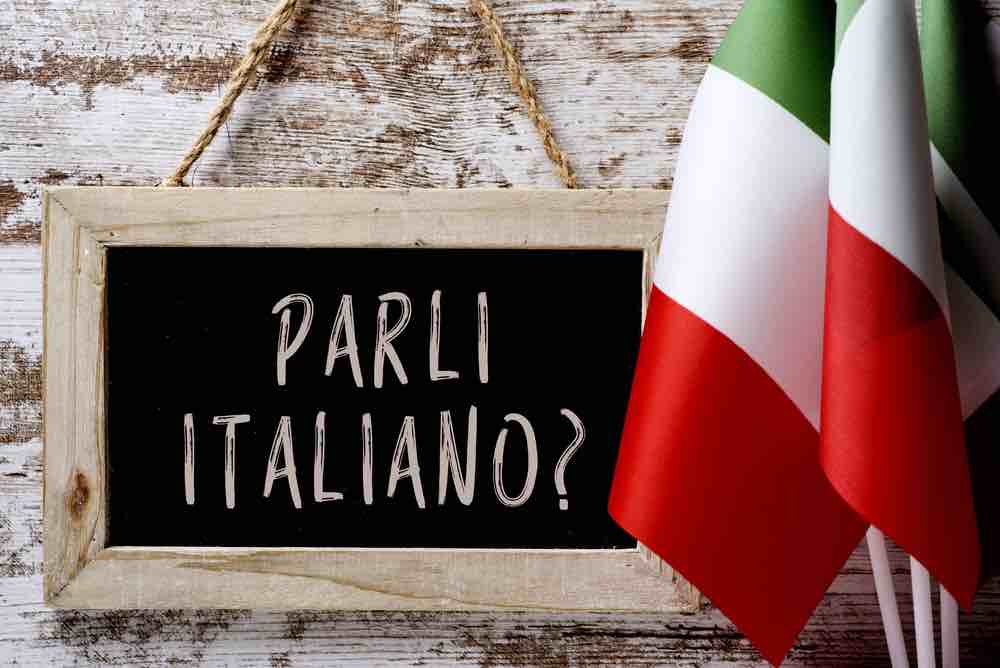
Travelers Italian: 100+ of the most useful Italian phrases for travel
Travelers’ Italian. Over 100 easy and useful Italian phrases for travel and basic Italian words that will help you make the most of your time in Italy (by a teacher)
You do not need to speak Italian to enjoy your time in Italy.
However, knowing basic Italian words or being able to express simple sentences will go a long way to improve your stay.
We Italians love it when foreigners make an effort and while I know it is daunting to express yourself in a language you do not dominate, you will see most people will react with great appreciation!
I am a qualified teacher of Italian as a second language and most of my students came to class before a trip to Italy, to learn Italian phrases tourists could learn or carry with them while in Italy for quick reference.
Today, I want to share the travelers’ Italian phrases most commonly requested in my classes.
These, we found, were the most useful Italian phrases for tourists and were all reasonably easy to learn or read out when needed!
As you will see, it is a mix of basic Italian words and Italian phrases for tourists that cover situations you may encounter while traveling in Italy.
I hope you find them useful!
This article is part of our series ‘Learn Italian’. You can find here >>> all our free Italian lessons <<<
You can hear the pronunciation of these Italian phrases for tourists copying them into google translate and clicking on the little megaphone symbol – try here
Basic Italian words and Italian phrases for travel
Before you learn specific Italian phrases for travel, you want to learn your basics.
- Si – yes
2. No – No
3. Grazie – thank you
Grazie is the most common way to express gratitude in Italian but there are several others you may hear or want to use. Learn how to say thank you in Italian here.
4. Prego – you are welcome / please
5. Per favore – please
Please can be tricky to express in Italian. Learn how to properly say please in Italian here.
6. Mi scusi – Excuse me
7. Scusi – Sorry
8. Non capisco – I don’t understand
9. Non parlo italiano – I don’t speak Italian
10. Aiuto! – Help !
Simple Italian phrases to make yourself understood
Parla inglese? – Do you speak English?
Mi dispiace, non parlo Italiano – Sorry, I don’t speak Italian
Piu’ piano per favore – slower please
Puo’ ripetere , per favore? – Can you say that again, please?
Common Italian phrases to greet someone
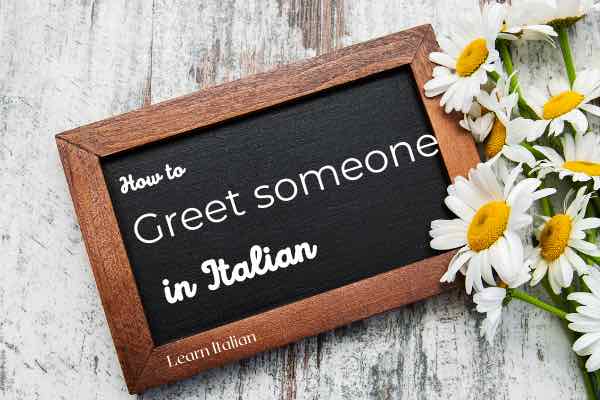
Ciao – hello / goodbye, informal
Buon giorno – good morning
Buona sera – good evening
Buona notte – good night
Buon pomeriggio – good afternoon, mostly used when parting from someone, slightly formal
Arrivederci – goodbye / bye bye (formal)
A presto – see you soon
Good to know : in most interactions with tourism establishments such as your hotel owner, host, ticket officer etc, you want to use greetings that are formal and polite. The most useful to learn are: buongiono (formal hello) and arrivederci (formal goodbye, at the end of a stay or a meal).
You can learn how to say hello in Italian here
Asking for directions – basic Italian travel phrases if you are lost
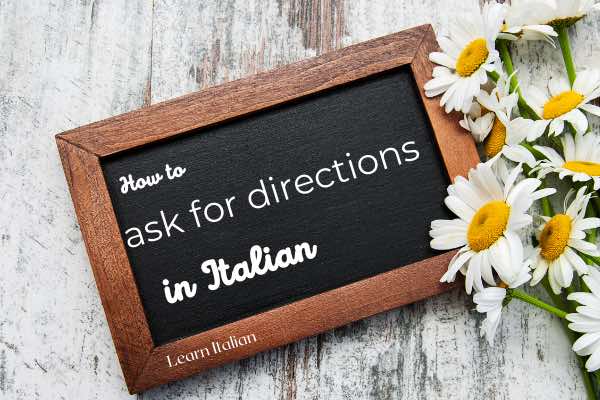
Dov’e’ ? – where is?
Ex Dov’e’ il Colosseo? Where is the Colosseum?
Ore more politely: ITA: Mi scusi, mi sa dire dov’e’ il Colosseo? ENG: Excuse me, would you be able to tell me where the Colosseum is?
E’ lontano? Quanto dista? – It is far? how far is?
How far is the Colosseum? Quanto e’ lontano/ Quanto dista il Colosseo?
Dritto – sraight
Destra – right
Sinistra – left
Semaforo – traffic light
Incrocio – crossroads
Ponte – bridge
Strada – street
Strisce / strisce pedonali – zebra crossing
Senso unico – one way street
Piazza – square
ZTL – Zona Traffico Limitato, an area closed to car traffic. Learn what they are and how to deal with them in this guide about driving in Italy.
Parcheggio -parking
A sample conversation may look like:
You: Scusi, dov’e’ il colosseo? Excuse me, where is the Colosseum?
Answer: vada dritto, poi al semaforo gira a destra e lo vede . Go straight, then at the traffic light turn right and you see it.
Another example can be: You: scusi, dov’e’ il bagno? (Excuse me, where is the restroom?) Answer: in fondo a destra (at the end of the room, to the right)
Transport and tickets
At train stations, airports and transport hubs, you may encounter or need to use the following Italian travel phrases and words:
Biglietto – ticket
Biglietto di sola andata – one way ticket
Biglietto di andata e ritorno – return ticket
Riduzioni / tariffe speciali / sconti – disxounts and special tariffs, usually for children/elderly/teachers/specified categories
Posto a sedere – seat
Treno – train
Binario – platform
Porto – harbor / port
Cabina – cabin (on a boat)
Traghetto – ferry
Aliscafo – hydrofoil (you will hear it to go to Capri for instance)
Prenotazione – booking / reservation
When you book a train ticket, it may come with a warning ‘prenotazione obbligatoria’, which means booking for a specific date/time/seat is mandatory.
Taxi – taxi
Autista – driver
Basic Italian sentences when at the shop
Quanto costa – How much is this?
Prezzo – price
Saldi – sales
Ha il resto? – Do you have change (if you are paying with a big note)
Carta di credito – credit card
Bancomat – debit card / also ATM
Posso provare? Can I try this on?
Do’ un’occhiata – I am just browsing / having a look
Si puo’ spedire? Can you ship this?
Caro – expensive Ex. No, grazie, e’ troppo caro . No, thank you, it is too expensive. Ex. Ha qualcosa di meno caro? Do you have anythign less expensive?
Top tip! To avoid embarrassing situations, learn about the etiquette of negotiating in Italian markets and shops here (hint you don’t!)
Medical emergencies
A well equipped arsenal of travelers Italian needs Italian phrases for travel emergencies, just in case!
Sto male – I am sick / I am unwell
Ho bisogno di un dottore / chiamate un dottore – I need a doctor / call a doctor
Aiuto ! – help!
Farmacia – pharmacy / chemist
Ospedale – Hospital
Pronto soccorso – A&E
Medico di guardia – doctor on call
Medicina – medicine
Ricetta – prescription
Mascherina – face mask / Mascherina chirurgica : disposable face mask (medical)
Dottore – Doctor
Infermiere / infermiera – nurse (male/female)
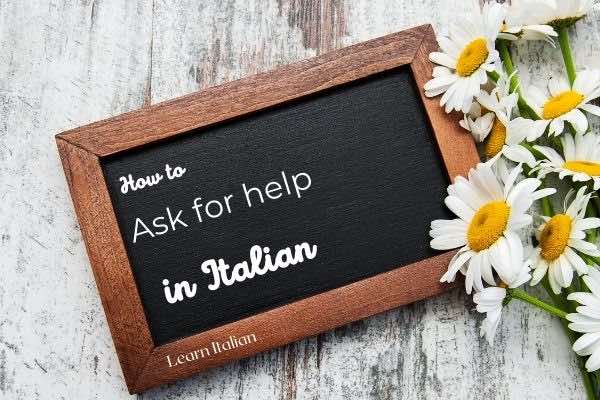
In hotel – useful Italian phrases about your accommodation
Camera – room
Camera matrimoniale – double room (with double bed)
Camere comunicanti – connecting rooms
Culla – baby cot/ crib
Letti a castello – bunk beds
Camerata – hostel room (with multiple beds)
Bagno in camera – en suite bathroom
Piscina – pool
Doccia – shower
Bagno – restroom
At the beach – useful Italian words for a day on the beach
Spiaggia – beach
Stabilimento – beach club
Ombrellone – sun umbrella
Sdraio – deckchair
Lettino – beach lounger
Bagnino – lifeguard
Crema solare – sunscreen
Secchiello e paletta – bucket and spade
Sabbia – sand
Scogli – rocks
Ghiaia – pebbles
At the restaurant – Italian words and sentences for a meal out
Food is such a large part of an Italian trip, my list of Italian phrases for travel needed a section about eating out, and so here it is!
Tavolo – table Ex. Ha un tavolo per quattro? Do you have a table for four?
Vino della casa – house wine
Acqua liscia / gassata – flat / sparkly water
Primo, secondo, contorno, dolce – these are the names of Italian courses. You can learn all about Italian meal structure here.
Mancia – tip (yes, you will need this one! Learn why here >>> guide to tipping in Italy
Allergia – allergy
Allergeni – allergens
Noci – walnuts / also generic word for ‘nut’
Noccioline – peanuts
Lattosio – lactose | Senza Lattosio = lactose free
Latticini / prodotti caseari – dairy products
Glutine – gluten
Kids essentials in Italian

Passeggino – stroller
Biberon – baby bottle
Ciuccio – soother / pacifier
Pappa – baby meal
Seggiolone – high chair
Pannolino – nappy / diaper
Pediatra – pediatrician
Scaldare – to heat: useful if you want to ask a restaurant/ cafe to heat up you child meal you brought from home (Mi puo’ scaldare la pappa per favore? Can you heat the baby food please?)
If you are about to travel to Italy with a baby, read this !
Other useful Italian words for travel you may want to use
Bello / bella – beautiful (male/neutral and female)
Presto, tardi – early, late
In ritardo – late Ex. Il treno porta un’ora di ritardo . The train is one hour late
Come stai? Come sta? – How are you? (informal / formal)
Piacere – when introduced to someone, how do you do
Gratis – for free
Salute! – Cheers! You can find the many ways to say cheers in Italian here.
Stagione – season, you may find it on price lists as Alta stagione ‘high season’; bassa stagione= ‘low season’. Learn here >>> how the seasons are called in Italy
If you are in Italy for the festive seasons, you may also want to learn how to say Merry Christmas in Italian or the Italian for Happy New Year .
I hope you found these Italian phrases for travel useful and you have a wonderful time in my beautiful country. Safe travel planning!
Travelers’ Italian – pin these Italian phrases for travel so you can carry them with you!
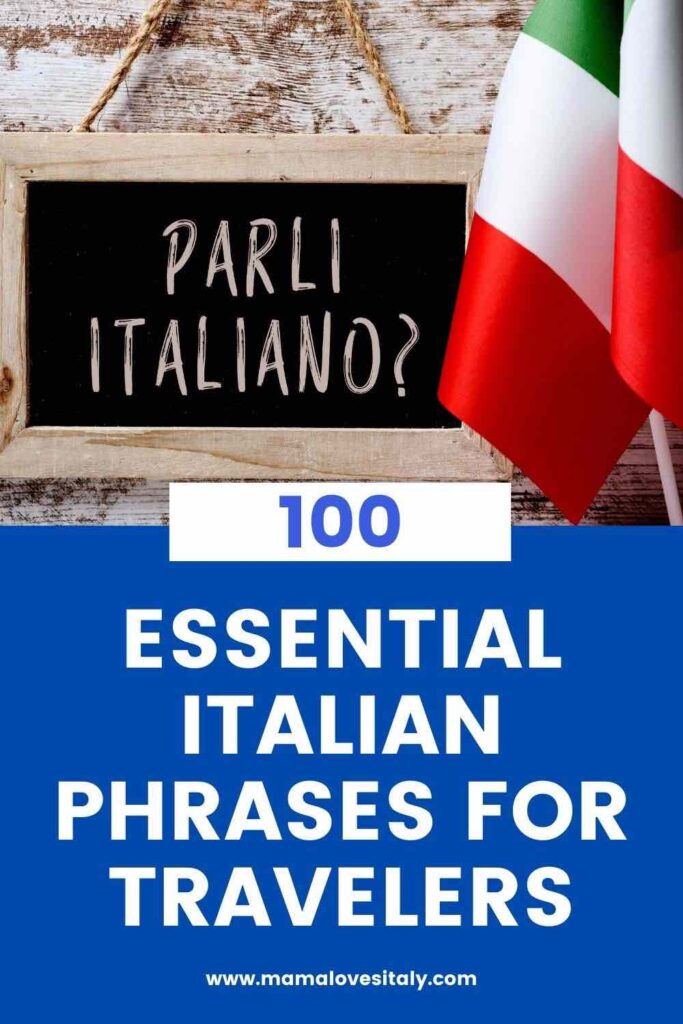
Marta Correale
Marta Correale is an Italian mama of two. Born and raised in Rome, Marta has a passion for travel and especially enjoys showing off Italy to her kids, who are growing up to love it as much as she does! A classics graduate, teacher of Italian as a second language and family travel blogger, Marta launched Mama Loves Italy as a way to inspire, support and help curious visitors to make the most of a trip to Italy and learn about Italian culture on the way.

You May Also Like

Torta Pasqualina Recipe: how to make Italian Easter pie

Italian Christmas Foods: traditional foods you’ll love

How to say hello in Italian
Privacy overview.
100+ Common Italian Travel Phrases For Your Trip (With Pronunciation)
23rd April 2024
Planning a trip to Italy? Or just want to learn some common Italian phrases? Get by and impress Italians with these 131 ready-to-use expressions!

Listen to the episode :
So, you’ve finally planned a trip to Italy, or are thinking of learning some Italian…
Wouldn’t it be great to “get by” with some of the most common Italian phrases?
Using Italian will allow you to connect with locals - plus you’ll stand out from those tourists who make no effort.
Here you’ll learn some typical Italian phrases for your trip to Italy.
But this isn’t a dusty old phrase-book!
All the expressions are up to date, and set out in the way Italians really use them. They’ll help you navigate those situations that can feel a bit overwhelming when you arrive somewhere new.
In the first few sections you’ll see the absolute essentials - the most common phrases that will help you get through your first interactions with Italians.
Later, you’ll find Italian phrases for travel situations, like eating, shopping and transport.
Then, to finish, a few special words you can use to put a smile on an Italian’s face!
Before we get started, a quick learning tip: 131 phrases are a lot, but you don’t need to learn them all now. We suggest bookmarking this page so you can find the right phrase when you need it.
Pronti? - Ready?
Cominciamo! - Let’s start!
Italian Phrases for Being Polite
Making sure you’re polite is a top priority when speaking a foreign language, so let’s learn those first:
These phrases speak for themselves. But watch out for the pronunciation of grazie - grats-yeh - it’s surprisingly tricky. Check out this post on how to pronounce grazie so you can impress Italians by sounding really native.
Now you know how to be polite in Italian , you’re off to a great start. But before you start talking to Italians, you’ll need to say “hello”!
Italian Phrases for Meeting and Greeting
If you spend any time in Italy, you’ll hear these all the time:
Although salve isn’t as famous as buongiorno, it’s a very handy word that can be used at any time of day. Plus, it’s a common greeting among native speakers, so it will help you blend in with the locals.
Common mistake alert! Most tourists say ciao all the time, because it’s the most famous Italian greeting. But did you know that it’s actually best avoided in common travel situations, because it’s informal? To sound really Italian, stick to salve or buongiorno/buonasera when arriving and arrivederci when leaving.
For a deep dive into this topic, check out this post on Italian greetings: How Italians really say hello to each other.
Learning tip: Speaking of first impressions… Don’t miss the chance to listen to the phrases as you go. Making an effort with pronunciation, especially when you’ve just started learning Italian, will help your conversations go smoothly.
So now you know how to say “hello” and be polite when you meet an Italian. But what if you don’t understand each other?
Next section to the rescue…
Italian phrases for communication
What can you say if you don’t understand? Perhaps you want to ask someone if they speak English, or encourage them to speak in Italian so you can practice! Learn how to manage communication in Italian with these phrases.
Ever feel like you keep asking people to repeat but still don’t understand that one word? Try repeating the word you don’t know slowly, in a questioning voice. Italians will realise you what you didn’t know and help you to understand.
Another problem you might have is that Italians keep switching to English, when you want to practice your Italian! The best solution is to simply ask if you can speak in Italian, because you’d like to learn. Many Italians will be delighted that you’re showing an interest in their culture and happy to help.
Now you’ve got the foundations in place, it’s time to learn a few common Italian phrases that you can use in loads of situations.
Italian Power Phrases
Combine these phrases to say an awful lot, without needing to learn any grammar. Sì!!!
These phrases cover so many basic requests you might need to make. For example, whether you’d like a coffee, a taxi or a train ticket, you can always use vorrei , followed by the word you want.
With these common Italian phrases, you can already say quite a lot! But what if you just need to pay for something quickly?
How to Pay for Things in Italian
One of the first things you’ll probably need to do: buy and pay for things . Later you’ll learn more specific phrases for bars, cafés, restaurants and shops - but here are the most common phrases you’ll need in all situations.
Keep in mind that Italians don’t normally say centesimi in the price. They usually use the short form un euro e dieci. For example:
- € 2,50: Due euro e cinquanta
- € 9,70: Nove euro e settanta
Pronunciation tip: Pay careful attention to the pronunciation of euro in Italian. In Italian, it starts with an eh sound, like in the word edge. Split it into three syllables and say EH - OO - RO.
When buying stuff, it also helps to have a basic grip of the numbers. To learn them in Italian, don’t miss these useful posts:
How to count to 20 in Italian
How to count to 100 in Italian
It’s thirsty work learning Italian numbers! Time to relax with a coffee or drink.
Italian Phrases for Bars and Cafés
One of Italians’ favourite pastimes is to socialise standing at the bar or sitting in terrazza. Once you’ve learned these common Italian phrases, you’ll be able to order drinks like a local .
You’ve arrived in Italy and a friend says you’ll meet at the bar… at 10 in the morning?? Well, confusingly, il bar is actually a “café” in Italian! Il bar in Italy serves coffee, and sometimes alcoholic drinks, too, so the difference can be a bit blurry. The locali are bars where you’d meet for drinks in the evening, for example, after a day of sightseeing.
Culture tip: Once you’ve arrived at il bar (the café), you can either sit down and wait to be served or order at the counter. It’s typical to see Italians stopping by for a caffé (an espresso) at the counter. Although it may seem strange, drinking your caffé standing up is very common in Italy.
If you’re curious to delve further into the different types of coffee, don’t miss this video which explains how to order coffee in Italy.
So you’ve been out for drinks, but what about sitting down at a restaurant?
Italian Phrases for Restaurants
Who doesn’t look forward to eating out when they go to Italy? If you’re keen to sample some Italian gastronomy, make sure you add these phrases to your essential vocab list.
When you’re going out for a meal in Italy , a good tip is to check if it’s the kind of place where you should reserve a table ( prenotare un tavolo ) in advance, especially on Friday and Saturday evenings. If in doubt, call and book, to avoid finding the place al completo, or “full”.
If you’re dining alone, you can adapt the phrases slightly and say:
Ho prenotato - I made a reservation
Sono pronta/o - I’m ready
Katie says sono pronta, as she’s female, and Matteo says sono pronto, as he’s male.
In Italy, dinner usually starts between 8 and 9:30pm, while lunch starts between 1 and 2pm. Kitchen hours may vary slightly, but Italians are surprisingly strict about meal times.
Once you’ve had a meal out, it’s time to hit the shops!
Italian Phrases for Shopping
Are you one for a bit of window shopping? Use these Italian phrases for shopping to navigate situations on the high street.
Culture tip: In Italy, it’s best to take contanti (cash) with you, especially if you’re moving away from big cities and touristy areas. Many places are still a bit behind the times when it comes to electronic payments.
For example, in a lot of places, you can only buy bus tickets in cash. And while we’re talking about getting around…
Italian Phrases for Travel and Transport
We all know that navigating nowadays is no longer dependent on asking passersby for directions. That said, it’s still useful to learn some common Italian phrases to help you get from a to b , especially if your phone’s out of battery or wifi!
Travelling in Italy can be quite different compared to other places, so here are a couple of tips to make sure everything goes smoothly:
Finally, if you’re lost, you can say mi sono persa/o. Katie would say: mi sono persa, as she is female, and Matteo would say mi sono perso, as he is male.
Perhaps you were making your way to the place you were staying?
Italian Phrases for Accommodation
Hotel staff often speak good English, but it’s still useful to have some key phrases up your sleeve!
If you’re checking in alone, the receptionist will say benvenuta or benvenuto . Benvenuta to Katie, as she’s female, and benvenuto to Matteo, as he’s male.
Learning tips: When saying camera - room - be sure to put the stress on the first syllable: CAmera. Note that you might also hear the word stanza, which has the same meaning.
Next up, let’s learn some little words you’ll hear all the time in Italy.
Helpful Little Italian Words
What makes these little words so helpful? Well, they’re useful in combination with other words in various situations. They’re also those little words you tend to forget - just when you really need them!
Here are some example sentences of when you might use these words:
Ecco la sua chiave - Here’s your key
Allora, cosa facciamo? - So, what shall we do?
Mi piace molto. - I like it a lot!
Caffè? - Un po’. - Coffee? - A little.
Parlo un po’ d’italiano - I speak a little Italian.
Vuoi un caffè anche tu? - Do you want a coffee too?
Anch’io! - Me too!
Con zucchero, per favore - With sugar, please.
Senza zucchero, grazie! - Without sugar, thanks!
Phrases to make Italians smile
Isn’t this what learning a bit of Italian before travelling to Italy is all about? If you can bring these phrases into your repertoire, you’re sure to really connect with the Italians you meet.
Buonissimo is a great word to use if you want to give someone a compliment about their food. It will help you connect with people working in restaurants, or anyone who cooks for you! It also sounds more natural than delizioso , the Italian word for “delicious”, which isn’t used as much.
Lo stesso, which means “the same”, can be used in an “I’ll have what they’re having” way. If you order after someone and you want the same thing, you can just say lo stesso. Or, if something on someone else’s table has caught your eye, just point to it and say lo stesso!
Finally, giusto is a nice, natural way to show you agree with someone, which is always handy to keep the conversation going.
Go forth and speak Italian
Ben fatto! Well done. You’ve now learned 131 Italian phrases for travel. If that feels like a lot to take in, don’t worry… it is. There’s no need to remember everything at once.
Keep this page saved so you can return and learn the phrases in smaller chunks. You can also take this article with you on your smartphone and review it at strategic times during your trip.
Now, if you’re ready to put your knowledge to the test, it’s time to take our quiz.
K: Ciao a tutti e benvenuti. Hi everyone and welcome to “Learn Italian with Joy of Languages”.
M: Before we get started, can we ask you a quick favore ? if you’re listening to this on your podcast app, could you hit the subscribe or follow button? This way you’ll get notified when we release a new episode and you’ll help our podcast grow so that we can keep making free lessons like this. Grazie!
K: If you’ve already been learning from our podcast, we hope you know a few things that will help you get by in Italy. Today, we’ll help you feel more confident using them so that if you’re planning on taking una vacanza, a vacation, in Italy soon, you’ll be able to use Italian.
M: Benvenuti a Napoli! Welcome to Naples. We’ll start with breakfast at the coffee bar, il bar, around the corner.
K: Which words are most appropriate for greeting the barista?
A. Buongiorno
D. Any of the above
M: There are two that work best: Buongiorno (x2) and Salve (x2). These are good for greeting people in the service industry that you don’t know. Ciao is often too informal, but you might hear it and use it if you know the barista.
M: Sometimes if the person is very informal they might greet you with ciao, in this case you can follow their lead, but otherwise it’s best to stick with buongiorno or salve.
K: Now, we’re going to need some caffeine for our day of Italian! There are a few different kinds of coffee in Italy. Which of the following words would you NOT usually hear in an Italian coffee bar?
1. Un espresso
2. Un cappuccino
3. Un latte macchiato
4. Un macchiato
K: It’s A! A normal coffee in Italy is an espresso, so there’s no need to specify . If you order un caffè, you’ll usually get a little shot the way Italians drink it. Then you heard 3 other common breakfast drinks.
M: Un cappuccino, which I think is international! Just remember to make the double P and the double C long. Un cappuccino.
K: Then there was un latte macchiato. Latte means “milk” and macchiato literally means “stained”. So it’s a glass of, usually warm milk, with a shot of coffee in it. Stained by the coffee
M: Un latte macchiato (x2)
K: You also heard un macchiato. Literally “a stained”. This is a shot of coffee with a dash of milk, usually served in a small espresso cup. It’s perfect if you want to try drinking coffee like Italians do but you want to take the edge off with a bit of milk.
M: Un macchiato (x2)
K: Time to order. How would you say “ I’d like…”
M: Vorrei (x2)
K: I’d like a macchiato ?
M: Vorrei un macchiato (x2). Ho fame! I’m hungry. Let’s get a croissant. Here in Naples, we call it un cornetto, and the pastry is usually thicker.
K: and un cornetto
M: e un cornetto
K: Let’s try the whole breakfast order:
M: Vorrei un macchiato e un cornetto (x2)
K: At the end, you can say “please”, per favore, or “thank you”, grazie
M: Vorrei un macchiato e un cornetto, grazie (x2)
K: You’ve finished your lovely Italian breakfast, and it’s time to pay. How would you say “I’d like to pay please?” to pay is “ pagare”. Let’s use per favore…
M: Vorrei pagare per favore (x2)
K: Next, time for some sightseeing. You might need the expression “where is…”. How would you ask that?
M: Dov’è (x2)
K: That’s a combination of dove , which means “where” and è which means “is”. We smooch dove and è together and get dov’è. Remember to make the è nice and strong.
M: Dov’è (x2)
K: Where’s the subway, the metro, la metro ?
M: Dov’è la metro? (x2)
K: Once you get to the center, you need to go towards the port. Where’s the port? Il porto
M: Dov’è il porto? (x2)
K: We want to catch a ferry across to one of the islands in the gulf.
M: Let’s go to Procida, my favourite.
K: You need to buy a ticket. Un biglietto (x2) I’d like a ticket.
M: Vorrei un biglietto (x2)
K: To Procida. In Italian, we literally say “for Procida”
M: per Procida
K: I’d like a ticket to Procida
M: Vorrei un biglietto per Procida (x2)
K: Once you’re there, you realise you’ve forgotten your towel, so you decide to buy one. How would you ask “how much does it cost?”
M: Quanto costa? (x2)
K: Nine euros
M: Nove euro
K: As you know, prices are rarely round numbers! Let’s say nine euros ninety. Ninety is novanta. In Italian we use “e” (and) to add the cents. Literally “Nine euro and ninety”.
M: Nove euro e novanta. (x2)
K: You had breakfast late and it’s very hot in the afternoon, so we decided to skip lunch. By the time we get back to mainland Naples, we’re very hungry.
M: Andiamo in pizzeria! Let’s go to the pizzeria.
K: How would you ask for a table for three?
M: Un tavolo per tre (x2)
K: Time to order some drinks. What do Italians usually order with pizza?
1. Un limoncello
2. Un vino
3. Una birra
4. Un cappuccino
K: C, una birra.
M: Yes, it’s like a tradition, we normally drink beer with pizza.
K: I’d like a beer
M: Vorrei una birra
K: We’ve heard vorrei a lot. Let’s try a different way to order. Another way is per me, literally “for me”
M: Per me una birra (x2)
K: I order a margherita. For me a margherita:
M: Per me una margherita (x2) Then I order a una diavola , which has spicy salami on it. Per me una diavola
K: Diavola literally means “devil” but don’t worry, because food in Italy isn’t normally too spicy! You like the sound of this pizza, so you say “the same”.
M: Lo stesso (x2).
K: As you’re waiting for the pizza to arrive, you go to the bathroom. How would you ask “where’s the toilet?”.
M: Dov’è il bagno? (x2)
K: The pizza comes, and it’s delicious.
M: Buonissima (x2)
K: This time with an A, buonissimA, because it’s LA pizza. At the end of the meal, you ask for the bill. The bill please.
M: Il conto per favore (x2)
K: The waiter tells you to pay at the till. At the till, or cash register
M: Alla cassa (x2)
K: So you arrive alla cassa . You’d like to pay with a card. Can I…
M: Posso (x2)
M: Pagare (x2)
K: by card, literally “with the card”
M: con la carta
K: Can I pay by card?
M: Posso pagare con la carta? (x2)
K: Certo! Of course.
M: Finally, I’m feeling very tired and lazy after all that pizza. So I don’t want to take la metro.
K: We take, or “let’s take” is prendiamo
M: Prendiamo (x2)
K: Let’s take a taxi
M: Prendiamo un taxi (x2)
K: Ben fatto, well done, you got through the whole day in Italian! I hope you enjoyed your time with us in Napoli and you picked up some useful phrases.
M: Feel free to listen as many times as you like, the repetition can help a lot to make sure you’re feeling confident with the phrases before your trip.
K: And if you found this useful, we’ve prepared a special guide for you over on the blog, with a lot more travel phrases that will help you get by using the local language when you’re in Italy. To find it, head over to our website by clicking on the link in the description. Or you can go to italian.joyoflanguages.com/podcast and search for episode 136. Have a nice trip…
M: Buon viaggio!
Time to check your understanding and remember everything you just learned! Below you’ll find a mini-quiz and some vocabulary cards to help it all go in.
How much did you learn? Find out in the quiz!
Click here to take the quiz for this episode: 100+ Common Italian Travel Phrases For Your Trip
Buongiorno = Hello (formal, lit. “good day”)
Vorrei = I’d like
Vorrei un cappuccino, grazie = I’d like a cappuccino, thank you
Vorrei pagare, per favore = I’d like to pay please
Dov’è… = Where is…
La metro = The subway
Dov’è la metro? = Where’s the subway?
Un biglietto = A ticket
Vorrei un biglietto = I’d like a ticket
Quanto costa? = How much does it cost?
Un tavolo per tre = A table for three
Una birra = A beer
Lo stesso = The same (as in “I’ll have the same”)
Il conto, per favore = The bill please
Posso pagare? = Can I pay?
Posso pagare con la carta? = Can I pay by card?
Prendiamo un taxi = Let’s take a taxi
Flashcards: 100+ Common Italian Travel Phrases For Your Trip
Remember the vocabulary from this lesson by downloading the flashcards.
100+ Common Italian Travel Phrases For Your Trip
Not sure how it works? Click here to watch the tutorial
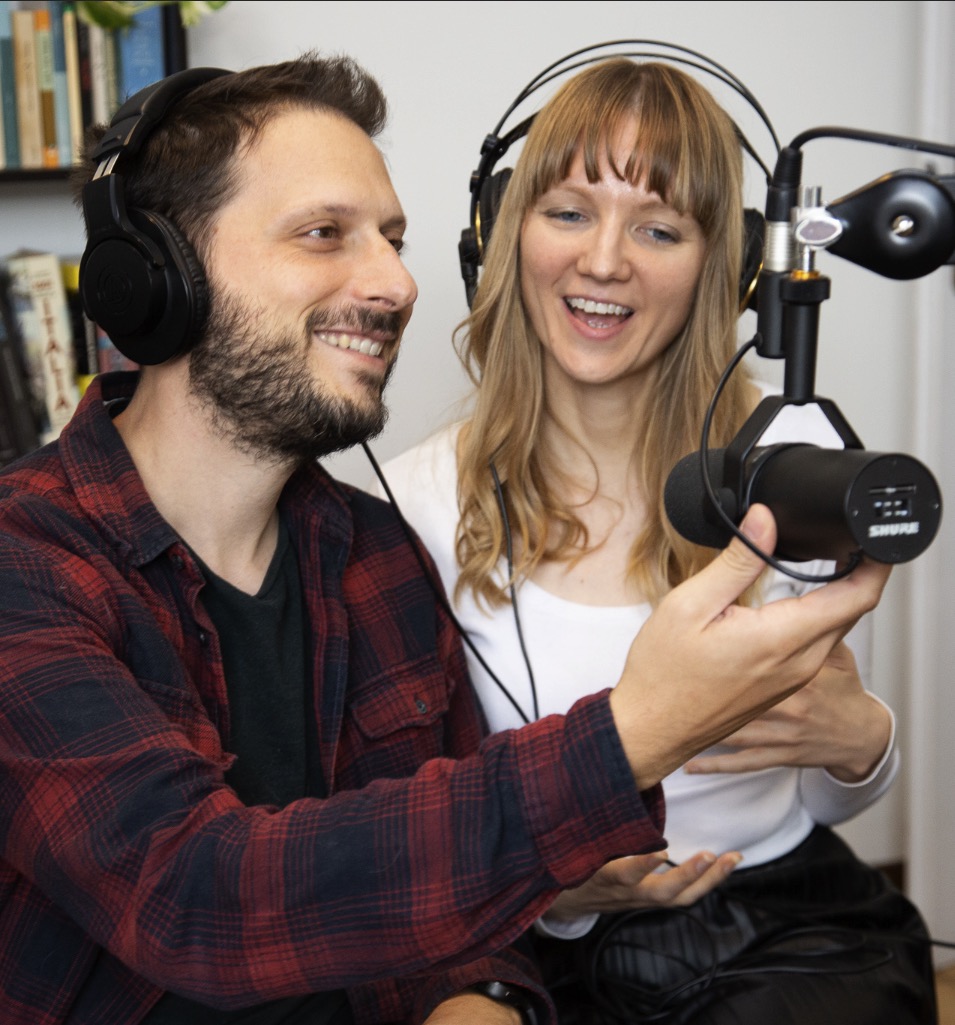
Mamma mia! You’ve signed up – but without our weekly free lesson
Our free weekly lesson is a great introduction to learning Italian in a fun and friendly way. No boring grammar or lists of random words. It’s all about real Italian conversation!
Be the first to hear when registration opens!
Plus! Also send me the free weekly lesson
Bellissimo!
30+ common Italian phrases for your trip to Italy
There's no better way to level up your trip to Italy than by practicing your Italian! Learning a few key phrases will help you feel more confident ordering in an Italian gelateria (gelato shop) and chatting with locals over an espresso and colazione (breakfast).
Here are the most important phrases you'll need in Italy!

Italian 101
You don't have to be fluent to have fun with Italian. You're on vacation, so don't stress! Enjoy using the Italian you know and see what else you learn along the way. (And you might be pleasantly surprised that even beginners can have real conversations !)
It's the effort that counts. Using some Italian shows locals that you're interested in their culture and community .
Study smart, not hard. Focus on the most useful Italian words and phrases , and worry less about getting every grammar detail right. A few key words go a long way!
Asking for help
Getting around town, ordering food.

Local language
Buon giorno! It's considered polite to greet people with "good morning" or "good afternoon" when you enter stores, cafés, or souvenir shops.
Soften those "k" sounds. In Tuscany, many "k" sounds are pronounced like "h"—so order a Coca Cola by asking for a Hoha Hola!
The beginning of your journey with Italian 🇮🇹
These basics will get you far in Italy, but there's a lot more Italian where that came from. To make real connections during your trip, let Duolingo be your guide! Our bite-sized lessons make it easy to fit study time into your busy schedule, and our entire Italian course is free—so you can save your euros for souvenirs.
Related Posts All Posts
16 common english acronyms every learner should know, how math can turn every meal into a masterpiece.
You are using an outdated browser. Please upgrade your browser or activate Google Chrome Frame to improve your experience.
170+ Key Italian Travel Phrases So You Can Travel Stress-free Around Italia
About to go on that Italian trip of a lifetime? Don’t forget to take some key Italian travel phrases with you before you set off on your adventure!
Even if you haven’t planned a trip to Italy, these travel phrases will be useful for any Italian learner looking to add more words and phrases to their vocabulary!
This post will show you more than 170 of the most common Italian travel phrases, words and questions to help you prepare for any situation you might find yourself in while traveling.
1. Essential Italian Phrases
2. italian greetings and goodbyes , 3. making small talk in italian, 4. asking for directions in italian, 5. italian question words, 6. italian words for shopping, 7. italian phrases for eating out, 8. italian words for emergency situations, 9. numbers, time and days of the week in italian, 10. transport words and phrases in italian, tips for learning italian phrases, and one more thing....
Download: This blog post is available as a convenient and portable PDF that you can take anywhere. Click here to get a copy. (Download)
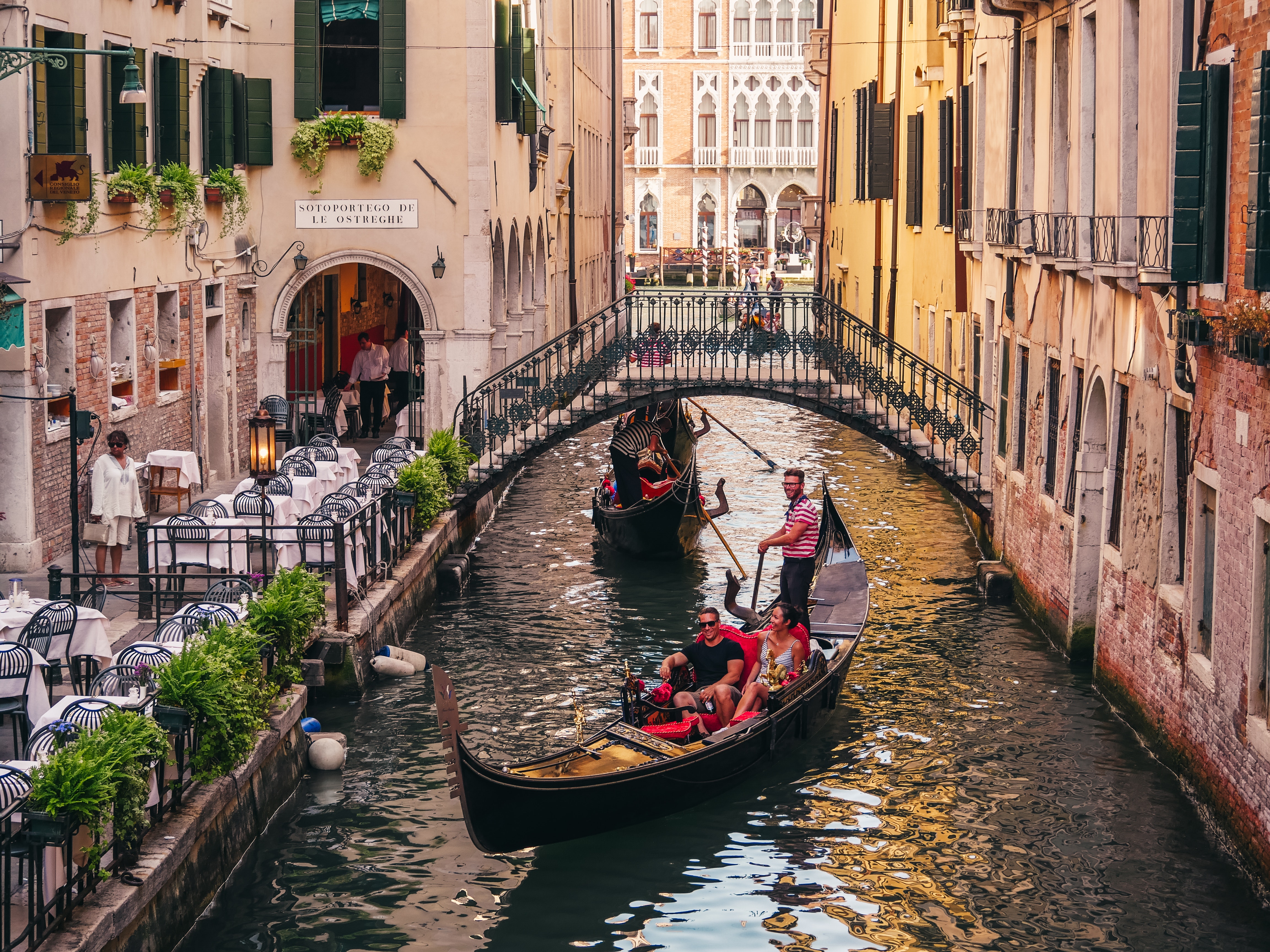
There are some basic words every Italian learner should learn as soon as possible. Here are some Italian essentials to remember!

It’s always polite to say hello and goodbye, no matter where in the world you are!
Remember these useful ways to say everything from “hi there” to “see you later!”
With these phrases you’ll be able to greet and converse with any Italian you may meet!
Check out this video to see 10 essential phrases used by Italians everyday.

It’s always good to have some small talk phrases under your belt. Here are some phrases that’ll help you carry on a simple, casual conversation when you meet someone new.
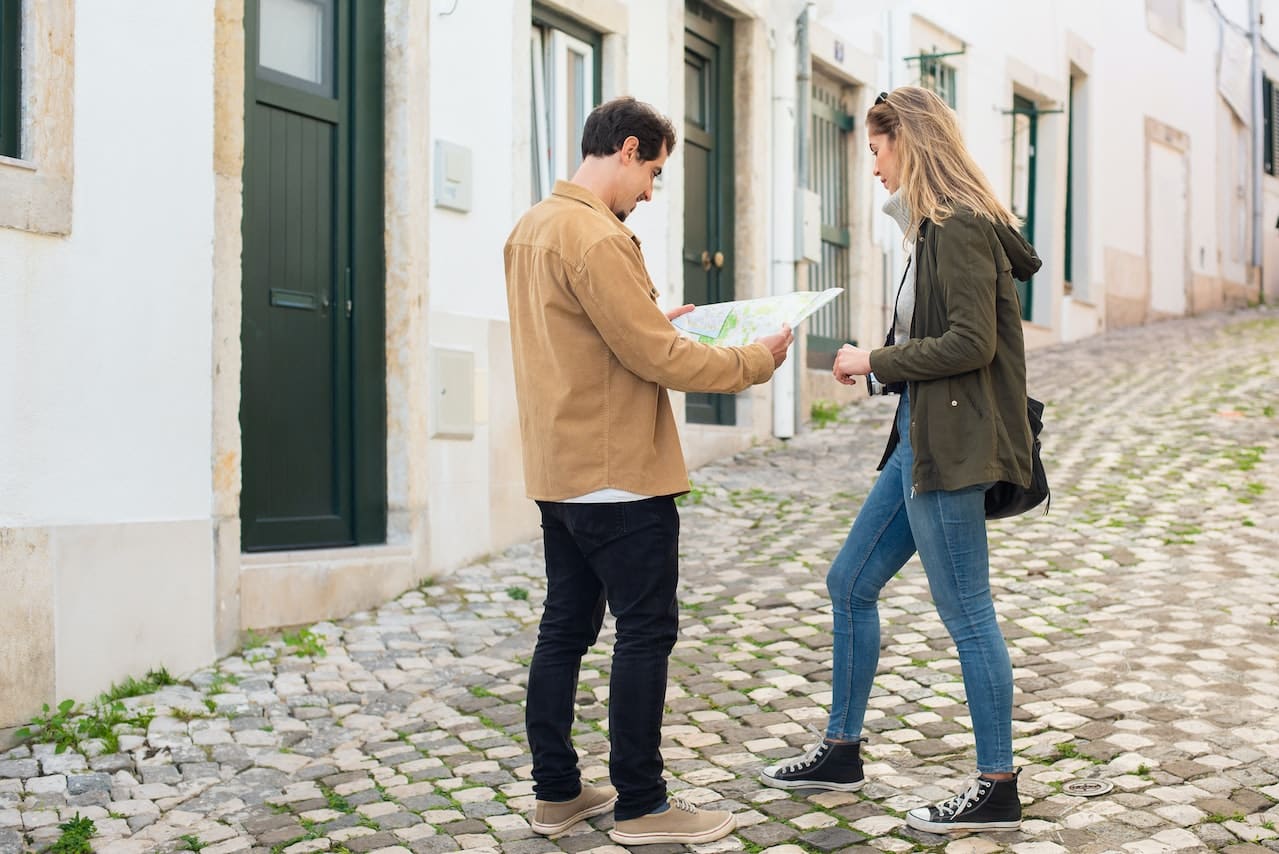
No matter how long you prepare for your trip— sooner or later, you’ll find yourself asking for directions.
Asking for directions starts with you approaching the other person with a “ Mi scusi ,” asking your question, then hearing the directions to your destination.
Here are some phrases that could help you navigate this conversation:

Some of the most important sentences you will hear are those that ask a question. Here are Italian question words that prefix Italian queries:
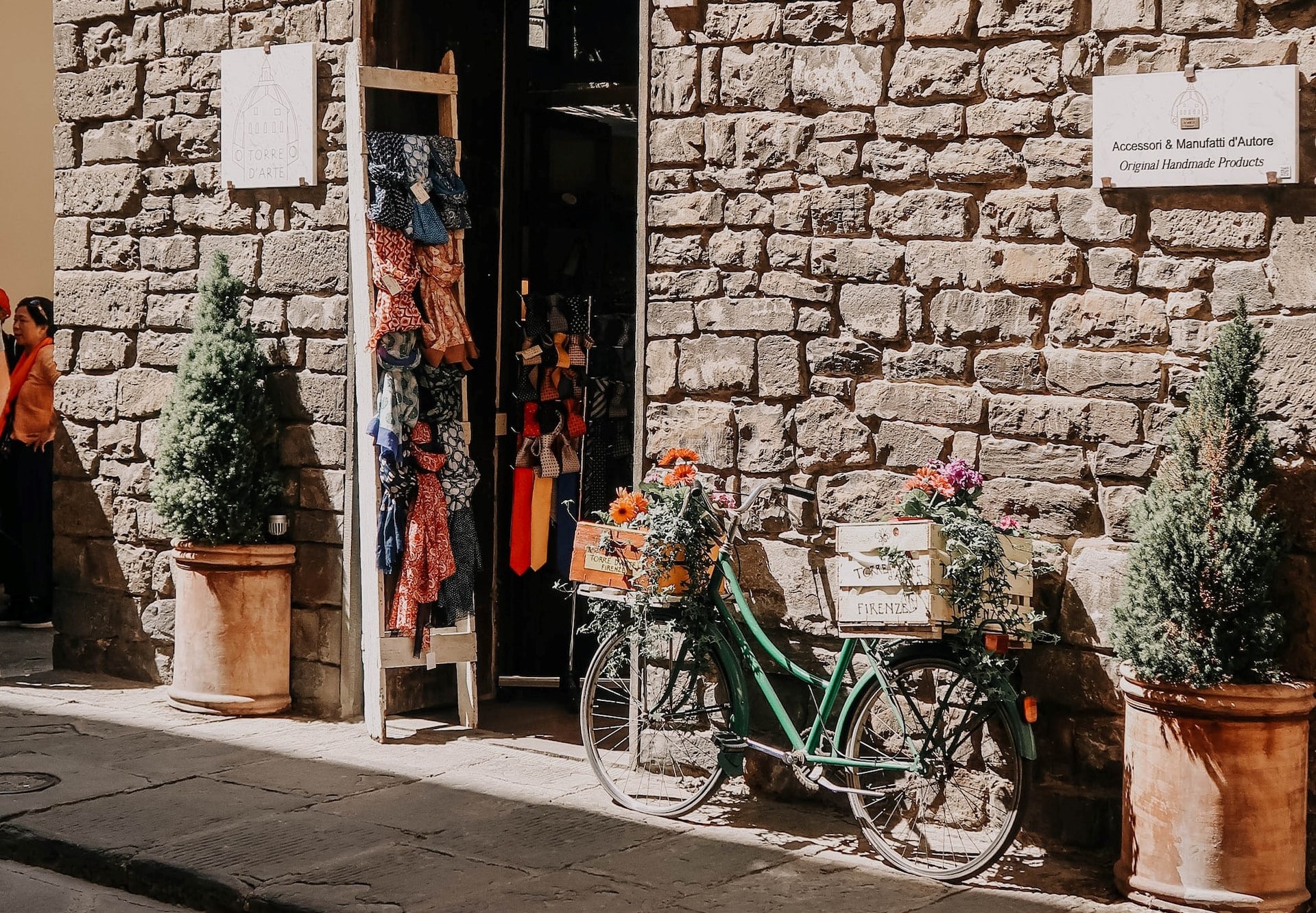
Chances are that if you visit Italy, you’ll probably be doing some shopping. Here are some terms to know so you can get by:

Italy is a land of good food and wine, so here are some words and phrases to help you have the best dining experience possible.
To learn more essential restaurant phrases and see them used in context by a native Italian speaker with Italian and English subtitles, check out this video.
By seeing these phrases used in context, you’ll quickly pick up on when and how to use them in your own conversations.

Vacations can be unpredictable, so it’s good to know how to ask for help and communicate that there’s an emergency:

If you’re learning Italian or planning on visiting Italy, then these words will be essential!
*The only time in Italian that uses the singular “è…” is one o’clock. For example: “È l’una” (It’s one o’clock) but all the other times use the plural form “Sono le…” in Italian. Check out this post for a more in-depth guide to telling the time in Italian.
As you can see, knowing how to count and say numbers in Italian is useful for many different situations. To learn more numbers in Italian, you can read about them in this post .
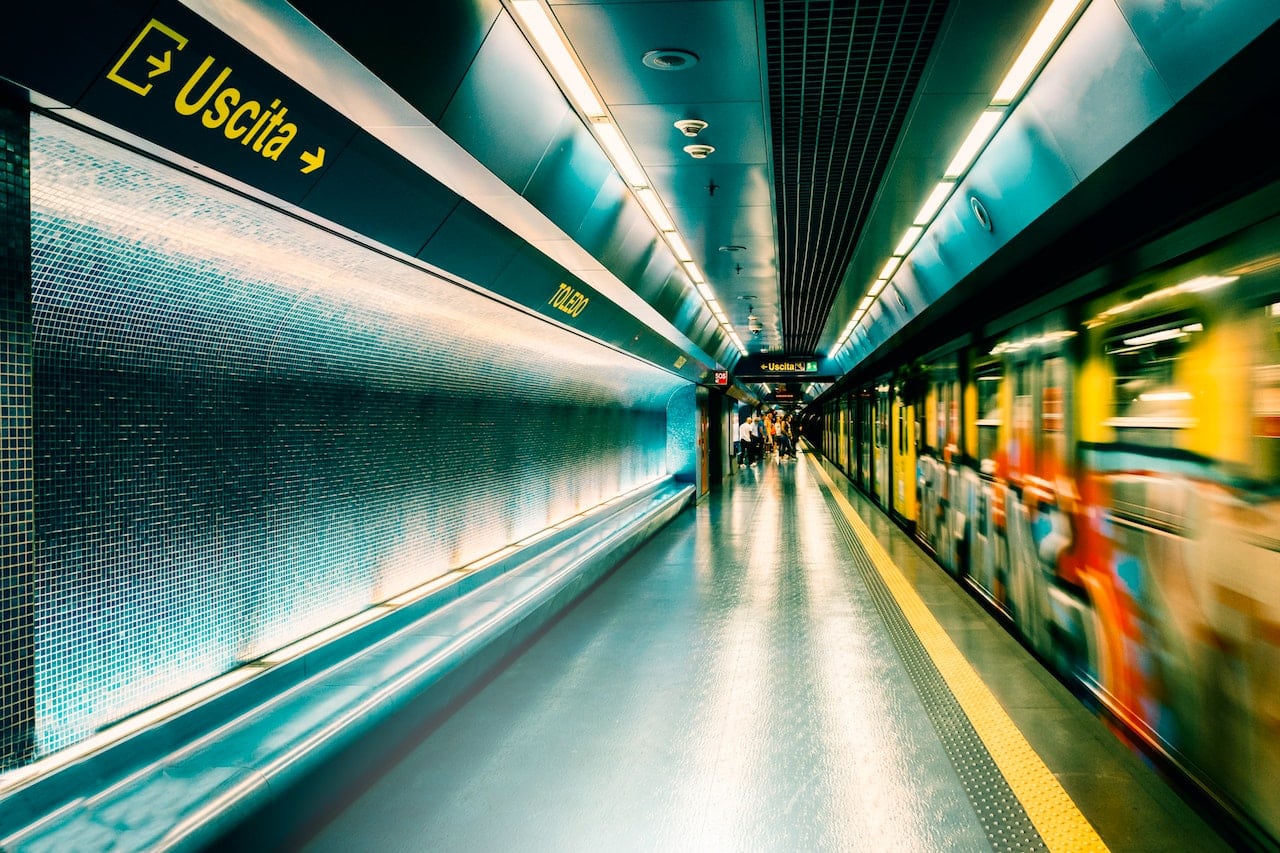
If you’re traveling in Italy, it’s likely you’ll have to travel in il taxi or il treno at least once!
Take a look at these phrases below to learn different ways of traveling and how to buy and book a ticket in Italian.
Now that you know these phrases for transport in Italian, you’re ready to travel!
But before you go, make sure you watch this video for travel tips for your trip to Italy.
1. Read them out loud.
The best way to master basic Italian phrases is by practicing them in actual conversation with others; however, you may not have access to an Italian speaking partner.
If this is the case, you can still get a bit of practice in saying these phrases by simply reading them out loud. Hearing yourself say these phrases is an essential step to learning them.
2. Role-play them in different contexts.
In addition to saying the same words or phrases in different ways, you can role-play them in different contexts.
Try to write out a sample dialogue of a situation that would actually use some of these phrases. Then, you can read them aloud and practice being on both sides of the conversation.
Going through this process helps you remember them more and playing both sides doubles your practice time.
3. Immerse yourself in Italian media
The more exposure to Italian you get, the quicker you’ll pick up on the language.
Try watching Italian movies, listening to Italian music or reading Italian books. All of these are sure to contain the phrases from these posts and much more.
You can also try using FluentU to learn Italian phrases and vocabulary in context.
FluentU takes authentic videos—like music videos, movie trailers, news and inspiring talks—and turns them into personalized language learning lessons.
You can try FluentU for free for 2 weeks. Check out the website or download the iOS app or Android app.
P.S. Click here to take advantage of our current sale! (Expires at the end of this month.)

Try FluentU for FREE!
4. Practice with a native speaker.
Having a language exchange partner will give you the opportunity to practice the basic Italian phrases that you know and receive feedback on how you’re doing from a native speaker.
If you don’t know any native speakers personally, you can quickly find a conversation partner online on a site like Easy Language Exchange , HelloTalk or Tandem .
5. Use them in your everyday conversations.
Try to find as many opportunities as possible to use basic Italian phrases in your daily routines.
A great way to practice without having to find a language partner is by thinking or narrating what you’re doing in Italian.
6. Use flashcards.
If you’re having difficulty memorizing Italian words, phrases and expressions, invest the time in making flashcards.
This classic method really does work and you can choose to do it the old-fashioned way by making your cards by hand or there are several apps available to make them with your phone such as those listed in this post .
Now you have everything you need to navigate basic situations in Italian!
Buon viaggio! (Safe journey!)
If you're as busy as most of us, you don't always have time for lengthy language lessons. The solution? FluentU !
Learn Italian with funny commericals, documentary excerpts and web series, as you can see here:
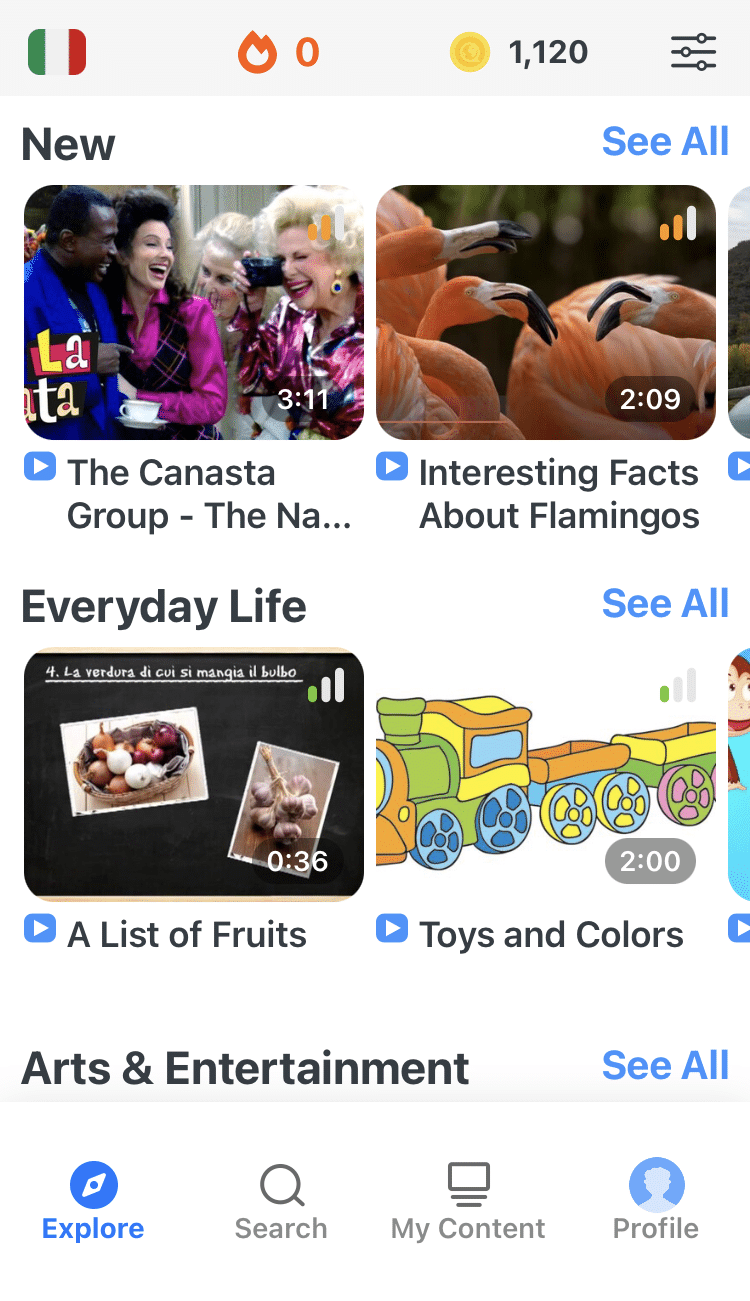
FluentU helps you get comfortable with everyday Italian by combining all the benefits of complete immersion and native-level conversations with interactive subtitles . Tap on any word to instantly see an image, in-context definition, example sentences and other videos in which the word is used.
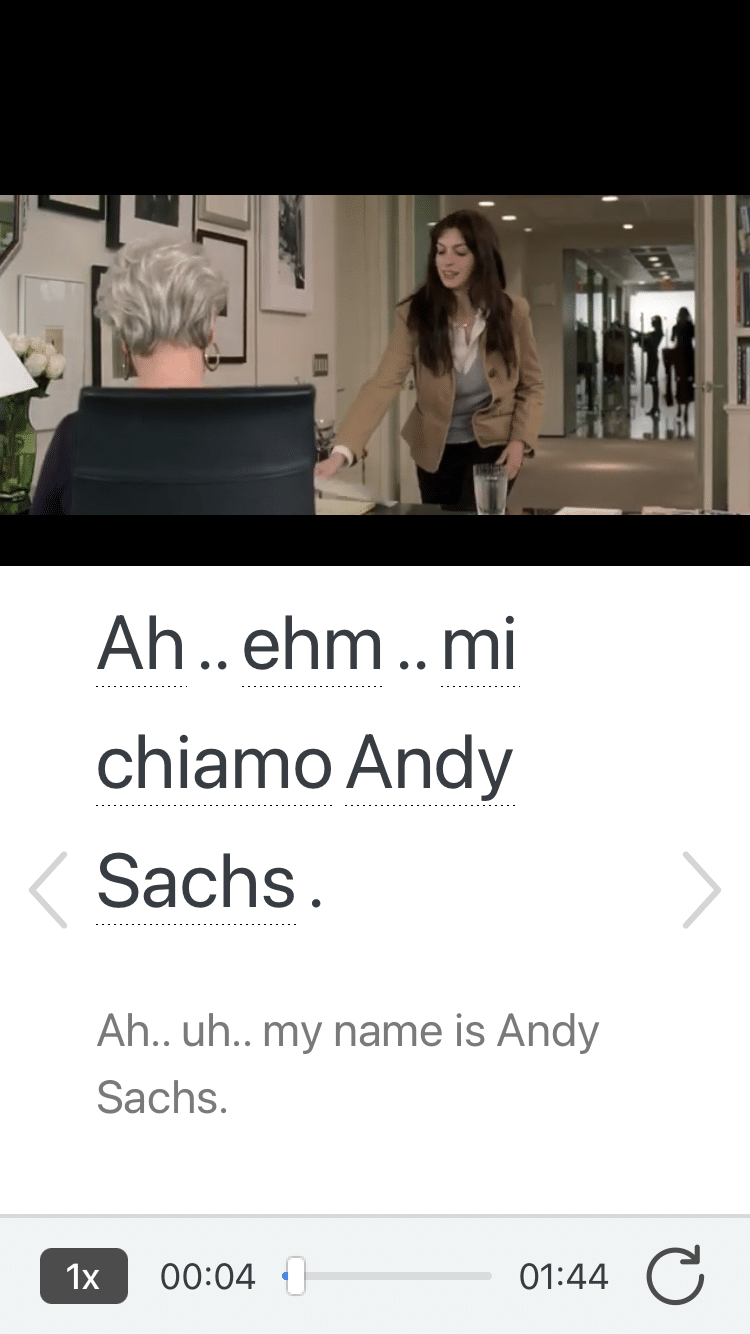
Access a complete interactive transcript of every video under the Dialogue tab, and review words and phrases with convenient audio clips under Vocab .
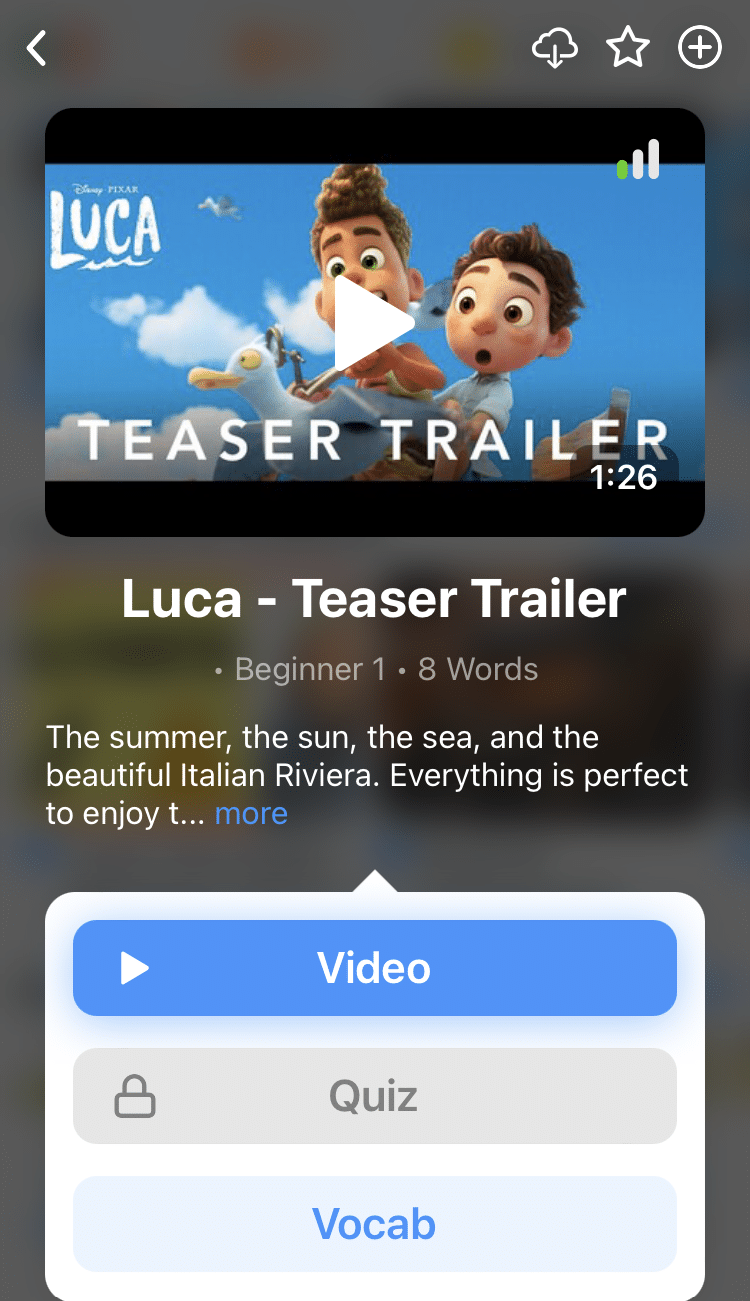
Once you've watched a video, you can use FluentU's quizzes to actively practice all the vocabulary in that video. Swipe left or right to see more examples of the word you’re on.
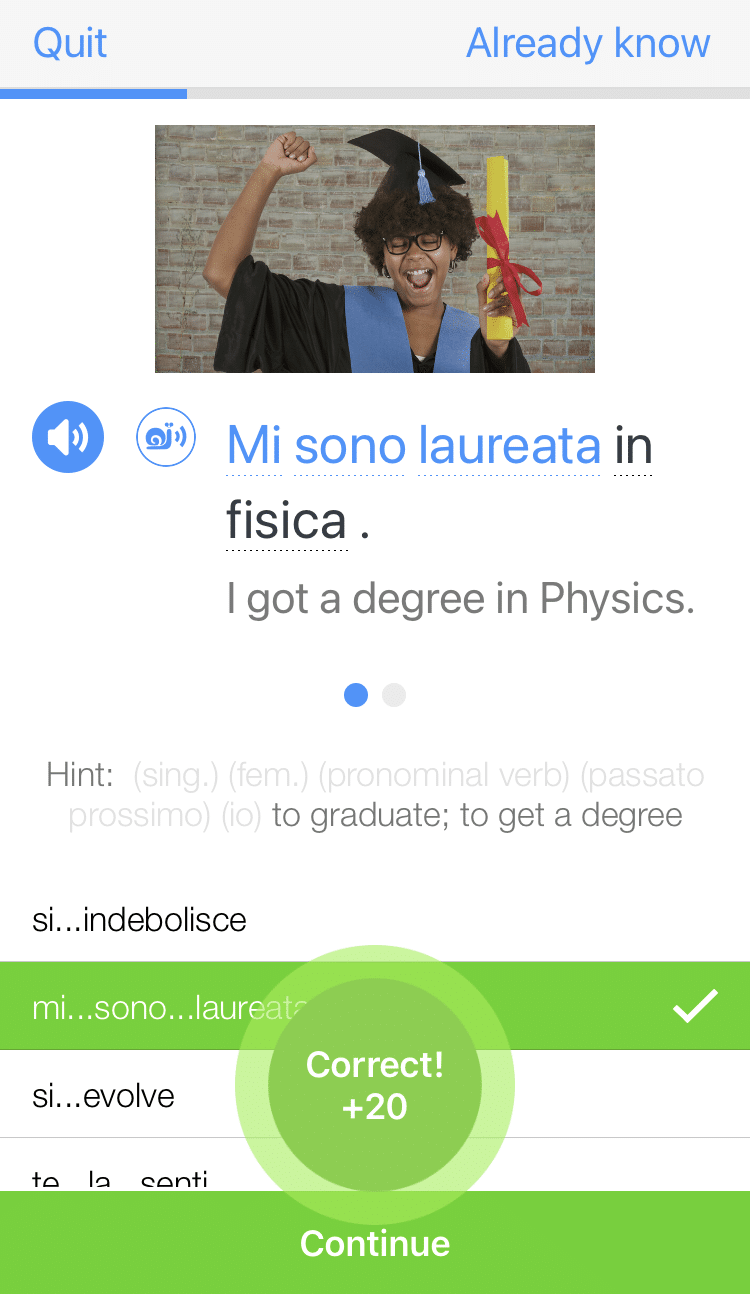
FluentU will even keep track of all the Italian words you’re learning, and give you extra practice with difficult words. Plus, it'll tell you exactly when it's time for review. Now that's a 100% personalized experience !
The best part? You can try FluentU for free with a trial.
Start using the FluentU website on your computer or tablet or, better yet, download the FluentU app from the iTunes or Google Play store. Click here to take advantage of our current sale! (Expires at the end of this month.)
Enter your e-mail address to get your free PDF!
We hate SPAM and promise to keep your email address safe


135 Basic Italian Phrases for Travel: PDF Cheat Sheet
Hello, fellow travelers, and welcome to your comprehensive guide on basic Italian phrases for travel .
With my experience as a native Italian language teacher, I’ve crafted this guide using insights gleaned from interacting with hundreds of international tourists.
My objective is to tackle the unique challenges you may encounter when immersing yourself in a new language during your travels in Italy . I aim to provide the best way to navigate these language hurdles for a smoother experience.
Planning a trip to Italy? Discover the 35 best travel guide books for Italy to enhance your adventure.
Certainly, Google Translate is handy, but learning basic Italian words and local phrases adds a special touch to your trip. Communicating in the local language can deepen connections with native speakers and unlock experiences that English alone may miss.
I’ve created a basic Italian travel phrases PDF to assist your journey. Accessible and user-friendly, it’s a good idea to download the PDF and make it your ideal companion for swift reference while on the move.
Are you ready to dive into the linguistic delights of Italian and elevate your travel experience? Let’s embark on this enriching journey together!
Basic Italian Phrases and Words
Let’s kick things off with a handful of essential Italian phrases and words that will prove invaluable in daily interactions with native Italian speakers.
These simple Italian phrases, which represent the essential Italian vocabulary, will showcase your attempts to connect with locals in their language, enriching your Italian adventure.
Recommended Reading : Discover the 21 safest cities in Italy for an unforgettable experience, whether you’re a traveler or an expat.
Common Italian Greetings

Italians are known for their warm and animated nature. Here are some Italian greetings to get you off to a fantastic start. Tossing out a heartfelt “buon giorno!” with a bright smile can go a long way.
To help you nail these greetings, we’ve listed the most popular key phrases, useful Italian words , and their appropriate use cases.
Formality is typically reserved for strangers and elders, while casual greetings are shared among friends.
Want to learn more about Italian verbs? Explore our comprehensive guide: Italian Verb Conjugation Made Easy with a handy PDF. chart.
Days of the Week and Times of the Day in Italian
Knowing the days of the week and how to tell time in Italian can enhance your travel experience .
This knowledge comes in handy while booking tours, checking opening times, or even planning your daily itinerary.
Here are the days of the week and some useful phrases related to time.
Recommended Reading : Learn how to count in Italian in no time.
Useful Italian Phrases at the Restaurant

Immerse yourself in Italy’s famed gastronomy with these common phrases designed to enhance your dining experiences.
If your Italian escapade includes savoring local cuisines or sampling delectable gelato (which it definitely should!), these essential basic phrases will be your greatest ally.
Useful Italian Phrases at the Hotel
Your hotel serves as your sanctuary while you traverse the landscapes of Italy. Here’s a list of Italian phrases with their English equivalent to ensure your stay is as comfortable as possible.
Useful Italian Phrases When Visiting Attractions

Italy’s rich culture and legendary landmarks are a significant part of any travel itinerary.
We’ve gathered some of the most important phrases to help you secure tickets and ask common questions at attractions to aid you.
How to Ask for Directions in Italian
Avoid getting disoriented in Italy’s labyrinth-like cities with these phrases designed to guide you through your journey.
Shopping Related Italian Phrases and Words

Shopping in Italy is an absolute treat, whether you’re hunting for the latest fashion, unique food items, or charming souvenirs. Here are some phrases to aid you on your shopping spree .
Kids Related Phrases in Italian
Venturing through Italy with your little ones? These phrases will prove immensely helpful in expressing their needs and ensuring they’re catered to.
How to Ask for Help in Italian

Should you require aid while exploring Italy, these phrases will be lifesavers in emergency situations.
While we hope you never have to use them, it’s always wise to remember the old saying, “ better safe than sorry .”
Basic Italian Phrases and Words for Travel FAQ
Answers to commonly asked questions about basic Italian phrases and words for travel.
Why should I learn basic Italian phrases before traveling to Italy?
Learning key Italian phrases demonstrates respect for Italian culture and makes your interactions with locals more meaningful. It can also enhance your overall travel experience.
Suggested Reading : Dive into the world of language learning with our top picks for the best 10 websites and apps to learn Italian through games .
How should I practice these phrases?
Regular practice is key. Try repeating the phrases aloud, writing them down, or using them in conversation. The provided PDF can be a handy resource for practice.
Where can I find a handy reference for basic Italian phrases with PDF?
Within this article, you can download our Basic Italian Phrases PDF cheat sheet, ideal for travelers. This extensive guide is designed to assist you in communicating with ease throughout your adventures in Italy.
Final Thoughts
As we wrap up this guide, remember that language is a beautiful gateway to culture.
By learning and using these essential Italian travel phrases, you’re set to make your Italian adventure even more enriching and memorable. So, embrace the language, enjoy the journey to this beautiful country, and buon viaggio—have a great trip!
Similar Posts

25 Key Facts About Florence, Italy: A Guide for Travelers

Colors in Italian: Essential Vocabulary & Expressions

Motorcycling in Italy: Top Destinations & Tips

30 Fun Facts About Naples, Italy: Explore Napoli’s Charm

What to Pack for a Trip to Italy: A Comprehensive Packing List
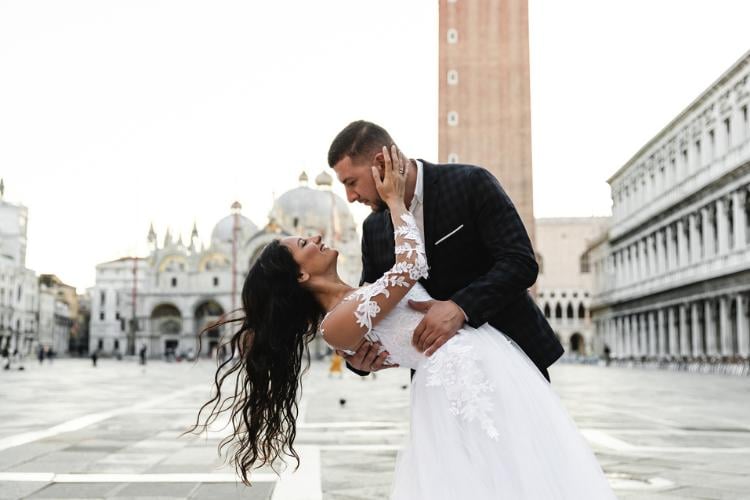
Wedding in Venice Italy: Your Guide to 15 Best Venues
- Skip to primary navigation
- Skip to main content
- Skip to primary sidebar
- Skip to footer
StoryLearning
Learn A Language Through Stories
94 Italian Travel Phrases Every Intrepid Adventurer Needs To Know
What better excuse to learn Italian or brush up on your Italian skills than a trip to Italy.
Italy is one of the world’s most popular travel destinations. Travellers flock there for the delicious food, beautiful sights, and rich culture.
But, when you only have limited time before your trip and you want to learn some Italian language basics, it can be hard to know where to begin.
- How do you know which phrases will be the most useful?
- What’s important and what can you skip over?
Luckily, I’ve created this handy guide to teach you essential Italian travel phrases you'll need to make the most of your trip . These phrases serve as a great crash course for basic communication in Italian. You can look it over at your leisure in the weeks leading up to your trip, or even blast through it on your plane ride.
Either way, when you get to Italy, you’ll be equipped with enough basic phrases to make ordering in restaurants, asking for directions, and befriending locals a breeze.
I’ve broken the guide down into a few sections to make your study-sesh even easier:
- Introductions
- Transportation
- Restaurants
- Emergencies
If you spend some time studying this guide, it’ll be easy to ask for what you need in any situation (and to make new Italian friends)! And a lot faster than trying to learn Italian from scratch .
By the way, if you want to learn Italian in time for your trip my top recommendation for language learners is my Uncovered courses, which teach you through StoryLearning®. Click here to find out more and try out the method for free.
Part 1: Travel Phrases To Connect With Italians
Mastering basic Italian greetings is the first step in learning to communicate in Italian. Think about how much a simple “hello” can be appreciated in your daily life. The same is true when you travel.
Italy is also home to kind and welcoming locals. Many Italians are enthusiastic about meeting and befriending travellers and showing them all that their country has to offer.
You'll find that people often greet you in passing or at the beginning of a conversation. Knowing the right way to respond is a great way to show them you’re making an effort to understand their language!
- #1 Ciao! – Hello/Goodbye (informal)
- #2 Salve! – Hello/Goodbye (very formal, you probably won’t hear this one very often)
- #3 Buon giorno! – Good morning! or Good day!
- #4 Buona sera! – Good evening!
- #5 Buona notte! – Good night!
- #6 Arrivederci! – Goodbye!
For these greetings, you would respond by saying the same word back to the person.
Learn More About Your Conversation Partner Or Get Clarification
Next, let’s take a look at how you would continue on to ask someone how they are doing and learn a little bit about them.
- #7 Come stai? – How are you? (formal)
- #8 Come va? – How are you? (informal)
- #9 Molto bene, grazie – Very well, thank you
- #10 Non sto bene/ Sto male – I’m not well
- #11 Come ti chiami? – What is your name?
- #12 Mi chiamo… — My name is…
- #13 Piacere – Nice to meet you (Literal translation: “pleasure”)
If you’re struggling to remember the phrases you want to use, or if you want to discuss something you don’t know the vocabulary for, you can ask if the person you are talking to speaks English.
- #14 Lei parla inglese? – Do you speak English?
- #15 Non capisco – I do not understand
Part 2: Italian Travel Phrases For Asking Directions
Half of the fun of traveling is exploring, and we all know that sometimes that means we have to ask for directions.
Whether you’re trying to find the train station or trying to get back to your hotel, you’re probably going to ask someone for directions at some point in your trip.
- #16 Dov’è… — Where is…
- #17 Mi sono perso – I’m lost
- #18 Il bagno – the bathroom
- #19 La stazione ferroviaria – the train station
- #20 L’ufficio postale – post office
- #21 Il mercato – the market
- #22 La farmacia – the pharmacy
- #23 L’ospedale – the hospital
And, of course, the next step is understanding what they say in response.
- #24 Gira a destra – Turn right
- #25 Gira a sinistra – Turn left
- #26 È qua vicino – It’s close by
- #27 Davanti – across from
- #28 Dietro – behind
- #29 Sotto – under
- #30 Prima – before
- #31 Dopo – past
If you're having trouble understanding or the person is talking too fast, it can help to hold out a map and have them point to what they are talking about as they explain.
And don’t forget to say thank you after someone gives you directions!
- #32 Grazie mille! – Thanks a lot!
- #33 Prego – You’re welcome
Part 3: Travel Phrases To Help You Get Around Italy
Once you know where you’re going, you have to figure out how you’re getting there. The next batch of words will help you converse about transportation.
Let’s start with some words and phrases you might need to use at the train station or the airport.
- #34 L’aeroporto – the airport
- #35 Il biglietto – the ticket
- #36 L’orario – the timetable
- #37 La partenza – departure
- #38 Il treno – the train
- #39 Il volo – the flight
- #40 Il bagaglio – the baggage
- #41 L’ufficio informazioni – the information office
- #42 Quando arriva lì? – When does it arrive there?
- #43 Quanto dura il viaggio? – How long does it take to get there?
When you’re travelling within a city, it’s more likely that you’ll be going on foot, by bus, or in a taxi. Next, let’s look at some words and phrases relating to those types of travel.
- #44 Fermata dell’autobus – bus stop
- #45 Mi serve un taxi – I need a taxi
- #46 Quanto costa la corsa? – How much is the fare?
- #47 Mi piacerebbe andare a… — I would like to go to…
Part 4: Italian Travel Phrases To Help You Taste Italy
For most travellers, one of the highlights of any trip to Italy is eating as much food as possible. In a nation known across the globe for its cuisine, you need to know how to order what you want to eat.
Did you know that there are lots of different types of restaurants in Italy? And they all have different names.
That's why deciding where to eat in Italy isn’t quite as simple as looking for a sign that says ristorante . You have to know what you’re looking for to find a place that will suit your mood and cravings!
- #48 Osteria – a moderately priced restaurant with a short menu of simple foods like pasta, grilled meat, and wine
- #49 Trattoria – a step up from the osteria , typically family-run, typically specialising in rustic home-cooked foods
- #50 Ristorante – a higher-end full-service dining establishment
- #51 Bar – shop selling coffee, beer, wine, and liquor, and occasionally grab-and-go food
- #52 Pasticceria – bakery
- #53 Paninoteca – sandwich shop
- #54 Enoteca – wine bar, sometimes also serving small plates
Understanding The Menu In Italian
Once you settle on a restaurant and take a look at the menu, you might be overwhelmed by your options. Most restaurants in areas that attract lots of tourists will have an English version of the menu.
But, some of the best food in Italy is off the beaten path, so it’s best to know some basics in case you venture into a restaurant that only offers its menu in Italian.
- #55 Pomodoro – tomato
- #56 Aglio – garlic
- #57 Sale – salt
- #58 Pepe – pepper
- #59 Insalata – salad
- #60 Cioccolato – chocolate
- #61 Pane – bread
- #62 Pollo – chicken
- #63 Bistecca – steak
- #64 Vitello – veal
- #65 Carne – meat
- #66 Pesce – fish
- #67 Carciofo – artichoke
- #68 Zucca — pumpkin
- #69 Porro – leek
- #70 Piselli – peas
- #71 Mela –apple
- #72 Fragola – strawberry
- #73 Arancia – orange
- #74 Pesca – peach
- #75 Vino – wine
- #76 Acqua – water
- #77 Succo – juice

How To Place Your Order In Italian
When you know what you want to order, you can always just point to it on the menu. But it's much politer to brush up on the proper way to order your food in Italian!
Your waiter will surely appreciate the effort and you might even strike up an interesting conversation and make a new friend.
- #78 Vorrei… — May I have…
- #79 La salsa è piccante? – Is the sauce spicy?
- #80 Possiamo avere il conto? – Can we have the check?
- #81 Per favore – Please
- #82 Sono allergico a… — I am allergic to…
- #83 Buon appetito – Enjoy your food!
Part 5: Italian Travel Expressions For Emergencies
Last but not least, I'll leave you with a chapter that I hope you won’t need to use.
When travelling, you need to be prepared. These are phrases that you can keep in your back pocket to use in case of an emergency. You can rest easy in your travels knowing that you're prepared for the worst-case scenario.
- #84 Aiutatemi! – Help me!
- #85 Chiami… — Call…
- #86 Polizia – police
- #87 Ambulanza – ambulance
- #88 Pompieri – fire brigade
- #89 Ho bisogno di un dottore – I need a doctor
- #90 Mi fa male qui – I have pain here. (You can point to the place that hurts)
- #91 C’è un incendio – There’s a fire
- #92 Attento – Watch out
- #93 Al ladro! – Stop, thief!
- #94 Vai via! – Go away!
Now You’re Ready For An Adventure In Italy
When you picture your next trip abroad, do you find your mind drifting to images of a Tuscan hillside or a bustling restaurant in Rome? Do you yearn for delicious pasta, pizza, and gelato? Do you dream of Florence’s museums or Venice’s canals?
Well, you're ready to turn those daydreams into a reality. Once you’ve mastered these words and phrases, you’re all set for an awesome adventure in Italy.
You’ll feel comfortable introducing yourself to people and asking them how they’re doing, asking for directions, getting around, and ordering a delicious meal in the perfect restaurant. Plus, you’re prepared in case of an emergency.
I hope you enjoy your time in Italy – and who knows? Maybe you’ll love it so much that you’ll decide you want to become fluent in Italian!
How To get Fluent In Italian, The Natural Way
You'll get so much more out of a trip to Italy if you know some basic Italian. And even more if you can have conversations with the locals.
You'll discover hidden sights off the tourist trail, make friends and remember your trip for the rest of the life. But how do you get conversational in Italian in time for heading off to Italy?
Well, you can use the StoryLearning® method – I used it to get fluent in Italian in 3 months , without touching a textbook or memorising grammar rules.
I've put it together into my course, Italian Uncovered , which takes you from beginner to intermediate level in Italian through the power of story.
So if you'd like to get fluent in Italian using the same methods as me in time for your trip, click here.
Language Courses
- Language Blog
- Testimonials
- Meet Our Team
- Media & Press
Download this article as a FREE PDF ?
What is your current level in Swedish?
Perfect! You’ve now got access to my most effective [level] Swedish tips…
Where shall I send the tips and your PDF?
We will protect your data in accordance with our data policy.
What is your current level in Danish?
Perfect! You’ve now got access to my most effective [level] Danish tips…
NOT INTERESTED?
What can we do better? If I could make something to help you right now, w hat would it be?
Which language are you learning?
What is your current level in [language] ?
Perfect! You’ve now got access to my most effective [level] [language] tips, PLUS your free StoryLearning Kit…
Where shall I send them?
Download this article as a FREE PDF?
Great! Where shall I send my best online teaching tips and your PDF?
Download this article as a FREE PDF ?
What is your current level in Arabic?
Perfect! You’ve now got access to my most effective [level] Arabic tips…
FREE StoryLearning Kit!
Join my email newsletter and get FREE access to your StoryLearning Kit — discover how to learn languages through the power of story!
Download a FREE Story in Japanese!
Enter your email address below to get a FREE short story in Japanese and start learning Japanese quickly and naturally with my StoryLearning® method!
What is your current level in Japanese?
Perfect! You’ve now got access to the Japanese StoryLearning® Pack …
Where shall I send your download link?
Download Your FREE Natural Japanese Grammar Pack
Enter your email address below to get free access to my Natural Japanese Grammar Pack and learn to internalise Japanese grammar quickly and naturally through stories.
Perfect! You’ve now got access to the Natural Japanese Grammar Pack …
What is your current level in Portuguese?
Perfect! You’ve now got access to the Natural Portuguese Grammar Pack …
What is your current level in German?
Perfect! You’ve now got access to the Natural German Grammar Pack …
Train as an Online Language Teacher and Earn from Home
The next cohort of my Certificate of Online Language Teaching will open soon. Join the waiting list, and we’ll notify you as soon as enrolment is open!
Perfect! You’ve now got access to my most effective [level] Portuguese tips…
What is your current level in Turkish?
Perfect! You’ve now got access to my most effective [level] Turkish tips…
What is your current level in French?
Perfect! You’ve now got access to the French Vocab Power Pack …
What is your current level in Italian?
Perfect! You’ve now got access to the Italian Vocab Power Pack …
Perfect! You’ve now got access to the German Vocab Power Pack …
Perfect! You’ve now got access to the Japanese Vocab Power Pack …
Download Your FREE Japanese Vocab Power Pack
Enter your email address below to get free access to my Japanese Vocab Power Pack and learn essential Japanese words and phrases quickly and naturally. (ALL levels!)
Download Your FREE German Vocab Power Pack

Enter your email address below to get free access to my German Vocab Power Pack and learn essential German words and phrases quickly and naturally. (ALL levels!)
Download Your FREE Italian Vocab Power Pack
Enter your email address below to get free access to my Italian Vocab Power Pack and learn essential Italian words and phrases quickly and naturally. (ALL levels!)
Download Your FREE French Vocab Power Pack
Enter your email address below to get free access to my French Vocab Power Pack and learn essential French words and phrases quickly and naturally. (ALL levels!)
Perfect! You’ve now got access to the Portuguese StoryLearning® Pack …
What is your current level in Russian?
Perfect! You’ve now got access to the Natural Russian Grammar Pack …
Perfect! You’ve now got access to the Russian StoryLearning® Pack …
Perfect! You’ve now got access to the Italian StoryLearning® Pack …
Perfect! You’ve now got access to the Natural Italian Grammar Pack …
Perfect! You’ve now got access to the French StoryLearning® Pack …
Perfect! You’ve now got access to the Natural French Grammar Pack …
What is your current level in Spanish?
Perfect! You’ve now got access to the Spanish Vocab Power Pack …
Perfect! You’ve now got access to the Natural Spanish Grammar Pack …
Perfect! You’ve now got access to the Spanish StoryLearning® Pack …
Where shall I send them?
What is your current level in Korean?
Perfect! You’ve now got access to my most effective [level] Korean tips…
Perfect! You’ve now got access to my most effective [level] Russian tips…
Perfect! You’ve now got access to my most effective [level] Japanese tips…
What is your current level in Chinese?
Perfect! You’ve now got access to my most effective [level] Chinese tips…
Perfect! You’ve now got access to my most effective [level] Spanish tips…
Perfect! You’ve now got access to my most effective [level] Italian tips…
Perfect! You’ve now got access to my most effective [level] French tips…
Perfect! You’ve now got access to my most effective [level] German tips…
Download Your FREE Natural Portuguese Grammar Pack
Enter your email address below to get free access to my Natural Portuguese Grammar Pack and learn to internalise Portuguese grammar quickly and naturally through stories.
Download Your FREE Natural Russian Grammar Pack
Enter your email address below to get free access to my Natural Russian Grammar Pack and learn to internalise Russian grammar quickly and naturally through stories.
Download Your FREE Natural German Grammar Pack
Enter your email address below to get free access to my Natural German Grammar Pack and learn to internalise German grammar quickly and naturally through stories.
Download Your FREE Natural French Grammar Pack
Enter your email address below to get free access to my Natural French Grammar Pack and learn to internalise French grammar quickly and naturally through stories.
Download Your FREE Natural Italian Grammar Pack
Enter your email address below to get free access to my Natural Italian Grammar Pack and learn to internalise Italian grammar quickly and naturally through stories.
Download a FREE Story in Portuguese!

Enter your email address below to get a FREE short story in Brazilian Portuguese and start learning Portuguese quickly and naturally with my StoryLearning® method!
Download a FREE Story in Russian!
Enter your email address below to get a FREE short story in Russian and start learning Russian quickly and naturally with my StoryLearning® method!
Download a FREE Story in German!
Enter your email address below to get a FREE short story in German and start learning German quickly and naturally with my StoryLearning® method!
Perfect! You’ve now got access to the German StoryLearning® Pack …
Download a FREE Story in Italian!
Enter your email address below to get a FREE short story in Italian and start learning Italian quickly and naturally with my StoryLearning® method!
Download a FREE Story in French!

Enter your email address below to get a FREE short story in French and start learning French quickly and naturally with my StoryLearning® method!
Download a FREE Story in Spanish!
Enter your email address below to get a FREE short story in Spanish and start learning Spanish quickly and naturally with my StoryLearning® method!
FREE Download:
The rules of language learning.

Enter your email address below to get free access to my Rules of Language Learning and discover 25 “rules” to learn a new language quickly and naturally through stories.
What can we do better ? If I could make something to help you right now, w hat would it be?
What is your current level in [language]?
Perfect! You’ve now got access to my most effective [level] [language] tips…
Download Your FREE Spanish Vocab Power Pack

Enter your email address below to get free access to my Spanish Vocab Power Pack and learn essential Spanish words and phrases quickly and naturally. (ALL levels!)
Download Your FREE Natural Spanish Grammar Pack
Enter your email address below to get free access to my Natural Spanish Grammar Pack and learn to internalise Spanish grammar quickly and naturally through stories.
Free Step-By-Step Guide:
How to generate a full-time income from home with your English… even with ZERO previous teaching experience.
What is your current level in Thai?
Perfect! You’ve now got access to my most effective [level] Thai tips…
What is your current level in Cantonese?
Perfect! You’ve now got access to my most effective [level] Cantonese tips…
Steal My Method?
I’ve written some simple emails explaining the techniques I’ve used to learn 8 languages…
I want to be skipped!
I’m the lead capture, man!
Join 84,574 other language learners getting StoryLearning tips by email…
“After I started to use your ideas, I learn better, for longer, with more passion. Thanks for the life-change!” – Dallas Nesbit
Perfect! You’ve now got access to my most effective [level] [language] tips…
Perfect! You’ve now got access to my most effective [level] [language] tips…
Join 122,238 other language learners getting StoryLearning tips by email…
Find the perfect language course for you.
Looking for world-class training material to help you make a breakthrough in your language learning?
Click ‘start now’ and complete this short survey to find the perfect course for you!
Do you like the idea of learning through story?
Do you want…?

- Learn to speak Italian for travel: words, phrases and methods
by michele lenzerini | Apr 12, 2024 | Learning Italian Language
You have saved and planned for months, and your dream trip to Italy is just around the corner. Whether you’re sightseeing in world-famous cities like Rome or Florence, you are booking a gondola ride in Venice, or a dream trip in the hills of Tuscany, you know you will enjoy the experience more if you speak a little basic Italian.
So, if you want to talk with people, order your food, and feel as though you fit in, even if you don’t know how to speak Italian perfectly, your first objective should be to learn Italian survival phrases.
You may also wonder whether you are too old to learn the basics of Italian for travel or whether you can afford to do so. Luckily, there are many ways to learn basic Italian travel phrases, fast and effectively . Here’s how!
First step: learn basic Italian for travel
You could feel frustrated walking into a situation in which you don’t know any words in the language at all. So, when you’re traveling through a foreign country, learning a little bit of the local language by yourself can go a long way. But it’s not enough to fare la valigia (pack your suitcase) and watch Italian language movies before you leave. You should at least learn the basics for travel, such as keywords and phrases, Italian numbers, how to pronounce Italian words, and ask questions in Italian.

Ciao! Come stai ?
You can find plenty of English speakers in Italy’s major cities. However, most Italians will appreciate you trying to speak their language; you’ll be surprised how many new friends you can make.
However, if you don’t have enough time to attend a real and proper Italian language course, here is a list of useful basic terms and phrases to learn for travel and to get you started:
Hello: Ciao Good morning: Buongiorno Good evening: Buonasera Please: Per favore; per piacere Thank you: Grazie You’re welcome: Prego; di niente How’s it going?: Come va? I’m sorry: Mi dispiace Excuse me: Mi scusi Excuse me (passing through a crowd): Permesso
Master Italian from home with specialized native instructors Join the online lessons of our school Easy Italian Language & Art

Learn Italian for travel: how to ask for direction
It is very important to learn how to ask for directions in Italian. Here are a few examples:
To go: Andare Straight: Diritto (dritto) To walk: Camminare Right: A destra Left: A sinistra To turn: Girare To stop: Fermare Close: Vicino Far: Lontano I am lost, can you help me?: Mi sono perso, può aiutarmi?
It can surely be useful to learn this list of words and phrases by heart, but maybe it is not enough. And what about the pronunciation of the Italian language? It can be a bit complicated for a beginner. And even if you think you have a pretty good understanding of Italian, you may not understand a word your neighbor is saying to you. And if you are asked to talk in another language, your heart might start to race a little.
Learning some of the basics of the Italian language for tourists by attending an Italian language survival course before traveling can save you a headache later on. The courses are dedicated to those who do not know the language but have the desire to communicate with simple phrases (such as ordering at the restaurant, learning to introduce themselves, understanding road information, booking a hotel or a plane ticket, and so on.).
The more effort you make to learn the language, the more immersed you will feel, and the greater the value you will receive from your travel experience.
Learn Italian for Travel from Home Experience Online Courses with Easy Italian Language & Art

Best ways to learn Italian before traveling
It is a wise idea to learn some basic Italian before moving to Italy and there are so many learning resources to choose from, it’s just a matter of deciding which suits your style of learning. Many learning options will make learning Italian easy and fun.
Full multimedia immersion
First of all, you can immerse yourself in the Italian language at home: listen to Italian music , podcasts , YouTube videos, audiobooks, movies, and TV shows in Italian. Try to turn on the TV on an Italian channel and leave it in the background while you are cooking or busy around the house: it is a way to pick up so much unconsciously of the Italian language.
Taking conversation: learn to speak Italian for travel
Practice speaking with someone who’s a native Italian language speaker. Communicating in your target language can be challenging and intimidating, so it is better to find a friendly native speaker who can help you improve your skills and build your confidence.
However, it is not always easy to find a native Italian speaker who takes the trouble or has the time to devote to the conversation, or in any case who is also able to help you with learning. Therefore, if you want to deepen or refine, or if you want to save yourself further frustrations and ready yourself by learning conventions of the language, you can take online Italian lessons with a mother tongue teacher. Whatever your level is, you can practice and learn simultaneously to help you boost your confidence and your command of the language.
And how to learn Italian for travel once you’re in!
Learning a foreign language is easiest to do by fully immersing in it, such as while living in a foreign country. However, finding yourself traveling in Italy before feeling completely comfortable in the Italian language can feel unsettling. Don’t worry, this is not an uncommon occurrence.
Here are some tips on how to travel and learn a language at the same time!

A real full immersion
If you are unable to use your native language, you will have no choice but to adapt. To learn a language while traveling, keep an app or language dictionary handy to look up new words and phrases. Once you learn a new word or phrase, listen to it carefully to how it sounds. Then, you can try to imitate it.
If you’re visiting Venice, you can join Italian language meet-ups , where you’ll have fun speaking Italian. Forget your native language for a while and immerse yourself in the Italian language: you just might surprise yourself with how much you already know, and how much you’ll learn along the way!
Release your inhibitions
Your first experience in speaking Italian will not be perfect, especially at the beginning of the trip. If you focus too much on perfecting the language, you are not likely to express yourself like you want to. This will also hinder your enjoyment of your travel experience.
Instead, locals will appreciate the effort you are making to speak their language rather than insisting they speak yours. Open yourself to helpful tips from native speakers , and soon you will find yourself speaking Italian in no time.
When all else fails, try to speak Italian with your hands: it is a way to share emotions that Italians will understand implicitly, and it will be much appreciated.
Studying Italian for travel at your hotel
If you’re traveling in Venice, Italy, you might enjoy waking up to the gentle sound of waves, and then having breakfast with espresso and pastry, just like an Italian . Afterward, you can continue your Italian day in the hotel garden, learning Italian in a fun and engaging way with a qualified teacher. Or perhaps in the afternoon, after a morning spent exploring Venice, or even in the evening.
You can choose how to learn Italian while traveling. You can join walking tours , Italian language meet-ups, lessons in museums , but also right in your hotel . It will be possible to learn Italian on a sun-kissed balcony, in a tranquil garden, or overlooking a bustling piazza. Each session will be a fun, professional, and immersive experience in the Italian language.
Study Italian for travel at your hotel Learn Italian in a fun and engaging way with a qualified teacher

Learn Italian for travel through experiences
Immersing yourself in authentic local experiences is probably the best way to learn Italian for travel. You can begin with the Italian survival course , a chat & walk course where you will spend one and a half hours walking in Venice and learning useful phrases in Italian without staying in a classroom.
For a tranquil evening escape, you can join the Venice Silent Tour . You’ll discover a different side of Venice, while learning Italian and stopping in front of buildings where Marco Polo, Casanova, Tintoretto, and other famous Venetians lived.
Water is central to the life and culture of Venice. To travel on this element and learn phrases and words in Italian to use during your trip, you can choose the Italian lesson on a sailing boat . You will spend a day in the Venice lagoon, the island of Burano, learning Italian through innovative and fun techniques.

Studying Italian by traveling
You have plenty of different options available for attending a language course in Italy. The easiest choice is to find a language course that lasts for a specific amount of time and fits your level of the Italian language.
But there is no need to lock yourself in a classroom and go back to school. An excellent opportunity is to attend an Italian course outdoors : this unique experience takes place in the astonishing city of Venice, where a mother tongue teacher takes you in the streets of the floating city, teaching in a communicative method while discovering parts of Venice’s history.
So if you do want to get into the Italian language, don’t forget that learning how to sound fluid and natural in Italian requires a lot of speaking practice and not just listening, reading, and writing. Most of all, it’s meant to be fun: make sure to engage in activities that you find joy in, such as traveling, visiting new places, and ordering an excellent meal at the restaurant. And experience a new country from the eyes of someone who is no longer a typical tourist.
Recent Posts
- Seasons in Italian and the Traditions of the Year: A Journey through the Months and Celebrations
- The most common Italian words and how to use them
- How to Learn Italian Fast: 10 Tips to Quickly Learn Italian
- Best books to learn Italian and easy Italian books for beginners
Recent Comments
- January 2021
- December 2020
- November 2020
- October 2020
- September 2020
- August 2020
- Italian Culture
- Learn Italian Online
- Learning Italian Language
- Entries feed
- Comments feed
- WordPress.org

Learn These 27 Basic Italian Travel Phrases for Tourists Before Visiting Italy!
Contrary to popular belief, the best way to learn Italian for travel isn’t to memorise an entire travel phrase book from start to finish, but rather, to pick out a few key phrases that will come in handy over the course of your stay in Italy … and that you will actually remember!
After all, there’s no point in learning complex sentences like “ Il terminal A è per i voli internazionali ” ( Terminal A is for international flights ) or very specific terms like “ il doganiere ” ( customs officer ) if you only ever use them once!
In this article, we’ve selected what we think are the twenty seven key Italian phrases tourists should learn before visiting Italy, simply because they are guaranteed to crop up over and over again. If you make the effort to memorise these common phrases, not only will you be able to communicate more effectively with Italians about your basic needs, but you will also show respect for the culture and language of Italy.
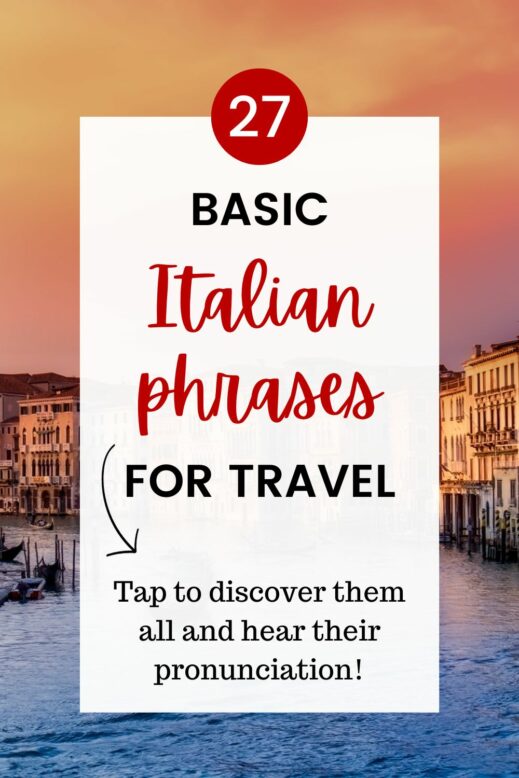
Buongiorno. Buonasera. Ciao. Arrivederci.
If you’re going to start anywhere, let it be with the most basic Italian greetings. Even if you forget everything else in this article, you can be sure that a friendly “Hello!” will go a long way towards making the Italians around you feel more comfortable and appreciated.
The most polite greetings you can use are:
Buongiorno.
Good morning . / Good day. / Hello (formal).
Good evening. / Hello. (formal)
These greetings should be used with people you don’t know, such as shopkeepers, waiters, or anyone else who provides you with a service. Although they translate as “ Good morning ” and “ Good evening ” respectively, they are often used in situations in which we would naturally say “ Hello ” in English.
When saying goodbye, the safest option is the expression arrivederci , especially in formal settings.
Arrivederci.
If you do know someone well, you can switch over to everyone’s favourite informal greeting ciao . What’s interesting about this word is that it is used, not only as a way of saying hello, but also to say goodbye.
Hi! / Hello! / Bye!

Parla inglese? Mi scusi, non parlo italiano (molto bene). Non capisco. Come si dice ___ in italiano?
Let’s face it: if you are a complete beginner, you are eventually going to want to communicate with someone in English, especially if your needs are more complicated than a simple trip to the bagno ( bathroom ). The best way to politely ask if someone speaks English in Italian is:
Parla inglese?
Do you speak English?
Of course, you may not be the one to initiate the conversation, in which case you can respond to the person by saying:
Mi scusi, non parlo italiano (molto bene).
I’m sorry, I don’t speak Italian (very well).
Or you can simply tell the other person that you don’t understand.
Non capisco.
I don’t understand.
If you’re keen on increasing your Italian vocabulary as you travel and interact with the locals, one phrase you simply cannot do without is:
Come si dice [station] in italiano?
How do you say [station] in Italian?
Your new Italian friend will (hopefully) respond in the following manner:
Si dice [stazione].
We say [stazione].
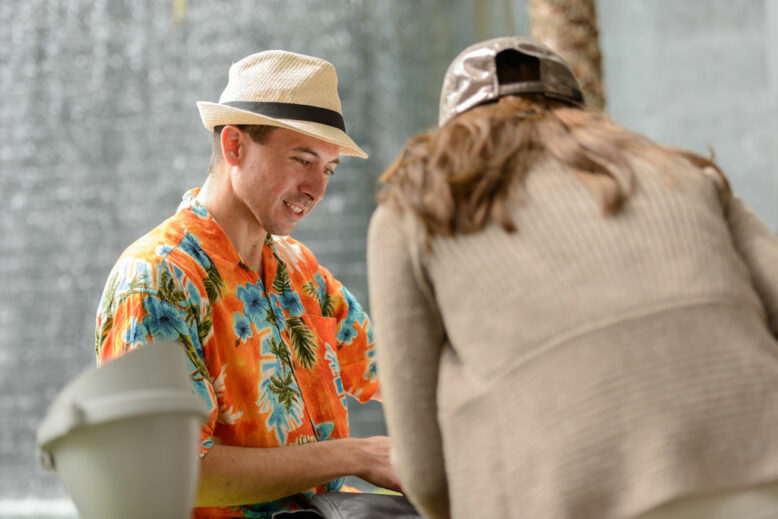
Può scriverlo per favore?
Sometimes verbal communication has its limits. This is why it is so important to be able to ask someone to write things down, especially if it’s important information such as an address or a telephone number .
The best way to ask this question in Italian is:
Can you write it down please?
Another version you’ll often hear starts with Me lo , where me is a first-person pronoun ( me in English). In this case, lo is no longer found at the end of the verb.
Me lo può scrivere per favore?
Of course, you can always replace “ lo ” ( it ) with the specific thing you’d like written down. For example:
Può scrivere l’indirizzo per favore?
Can you write down the address please?
Può scrivere il numero di telefono per favore?
Can you write down the telephone number please?

Dov’è ___? Dove sono ___? Come posso arrivare a/in ___? Sto cercando ___.
One of the most essential Italian phrases every tourist needs to know is “ Where is / are…? ” After all, what could be more important than getting your bearings in a city that’s completely unfamiliar to you?
The singular version of this question is as follows:
Dov’è [la stazione]?
Where is (the station)?
And the plural equivalent is:
Dove sono [i negozi]?
Where are [the shops]?
Once you’ve memorised this question, it is simply a matter of filling in the blank with the right noun. Here are a few common places people look for while travelling:
- i servizi (igienici) = the washroom (polite)
- il bagno = the washroom (less polite)
- la stazione = the station
- il museo = the museum
- la fermata dell’autobus = the bus stop
If you’re feeling brave, you could also inquire how to reach a certain place using the following phrase:
Come posso arrivare [alla stazione]?
How can I get to [the station]?
Admittedly, this phrase requires a little more knowledge of Italian grammar, as it contains two possible prepositions ( a and in ) and the preposition a ( to ) changes form depending on the gender or plurality of the noun that follows. For example:
- Come posso arrivare alla stazione? = How can I get to the station?
- Come posso arrivare al museo? = How can I get to the museum?
- Come posso arrivare in centro? = How can I get to the city centre?
That being said, you will be understood even if you mix up a and in , or if you use a on its own.
One final way of discovering the location of a place is by using the relatively simple expression:
Sto cercando [la stazione].
I’m looking for [the station].
If you want to go a step further, you can use the construction with the verb potere ( can ) and trovare ( to find ).
Mi scusi, dove posso trovare [la stazione]?
Excuse me, where I can find [the station]?

Per favore. Grazie (mille). Prego.
Another way to endear yourself to the Italians you meet on your journey is to learn your “pleases” and “thank yous”.
We already encountered the expression per favore ( please ) in the phrase può scriverlo per favore , but here it is again on its own.
Per favore.
Thank you , on the other hand, is grazie – or grazie mille ( thank you very much ) if you wish to be more emphatic.
Grazie mille.
Thank you very much.
And if someone thanks you for something, the most straightforward way to respond is with the word Prego which means You’re welcome .
You’re welcome.

Quanto costa?
Whether you are buying a train ticket or picking out a souvenir for your best friend back home, it’s important to know how much you will end up spending. The easiest way to inquire about the price of something is:
How much does it cost?
If you are referring to more than one thing however, such as multiple souvenirs, you will need to put the sentence into the plural. Don’t worry if you accidentally use the singular form – Italians will understand you perfectly either way!
Quanto costano?
How much do they cost?
If you need or want to add the object of your purchase to the phrase, you can use a noun accompanied by its definite article ( il, lo, la etc.) or the demonstrative adjective questo/a ( this ).
Quanto costa [la sciarpa rossa]? Quanto costa [questa sciarpa]?
How much does [the red scarf] cost? How much does [this scarf] cost?

A che ora arriva / parte …? Quanto tempo ci vuole per arrivare a …?
If you are planning to make your way around the country using public transport, a very useful question that is worth memorising is:
A che ora arriva/parte [il treno]?
What time does [the train] arrive/leave?
Some common types of public transport include:
- l’autobus = the bus
- il treno = the train
- il tram = the tram
- il traghetto = the ferry
And once you’re on your way, you may wish to ask how much time it will take to get to your destination. Once again, the preposition a ( to ) may change form depending on the noun that follows.
Quanto tempo ci vuole per arrivare a [Torino]?
How much time does it take to get to [Turin]?
- a Roma = to Rome
- alla stazione = to the station
- al museo = to the museum
- all’aeroporto = to the airport
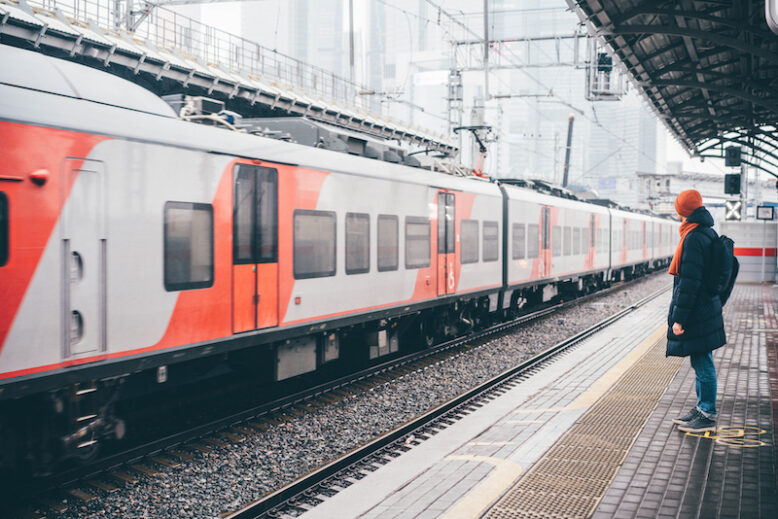
C’è? Ci sono? C’è un/una/un’ ____ qui vicino?
Whenever I start to dabble in a new language, one of the first things I try to master are the constructions “ there is ” and “ there are “. Why? Because they are amongst the most frequently used phrases in any language. The equivalent of “ there is ” in Italian is c’è whereas “ there are ” translates as ci sono .
C’è [un bar]. / Ci sono [dei negozi].
There is [a café]. / There are [some shops].
C’è and ci sono can be used to form, not only a statement, but also a question in Italian.
C’è [un bar]? / Ci sono [dei negozi]?
Is there [a café]? / Are there [some shops]?
An extremely common question you will hear is C’è un ___ qui vicino? which means “ Is there a ___ nearby? “
C’è un [museo] qui vicino?
Is there a [museum] nearby?
Keep in mind, however, that un (which is the masculine indefinite article) may change to una if the object is feminine, un’ if the object is feminine and starts with a vowel, or uno if the object is a masculine noun and starts with s + consonant or z . For example:
- C’è un museo qui vicino? = Is there a museum nearby?
- C’è una stazione qui vicino? = Is there a station nearby?
- C’è un’automobile qui vicino? = Is there a car nearby?
- C’è uno zoo qui vicino? = Is there a zoo nearby?
That said, don’t get too hung up on the various forms of the indefinite article. You will be understood even if you make a mistake!

Posso … Può … Vorrei …
Three additional terms I consider absolutely essential for travel around Italy are posso , può and vorrei . Let’s take a look at them one at a time.
Posso translates as either “ I can… ” as a statement or “ Can/May I…? ” as a question. It is very easy to use as it is always followed by the infinitive form of the verb (or in other words, the form found in the dictionary).
Posso venire. / Posso venire?
I can come. / Can I come?
Può means “ he/she/it can ” but in a formal context, it also translates as “ You can… ” or “ Can you…? “. We’d recommend using this form whenever you address someone you don’t know, such as a person on the street, a waiter or a shopkeeper.
Può scattarci una foto?
Can you take a photo of us?
Può aiutarmi?
Can you help me?
Finally, we have the extremely useful word vorrei which means “ I would like… / I’d like… “. It can be followed by infinitive verbs or nouns.
Vorrei un caffè.
I would like a coffee.
Vorrei comprare due biglietti.
I’d like to buy two tickets.
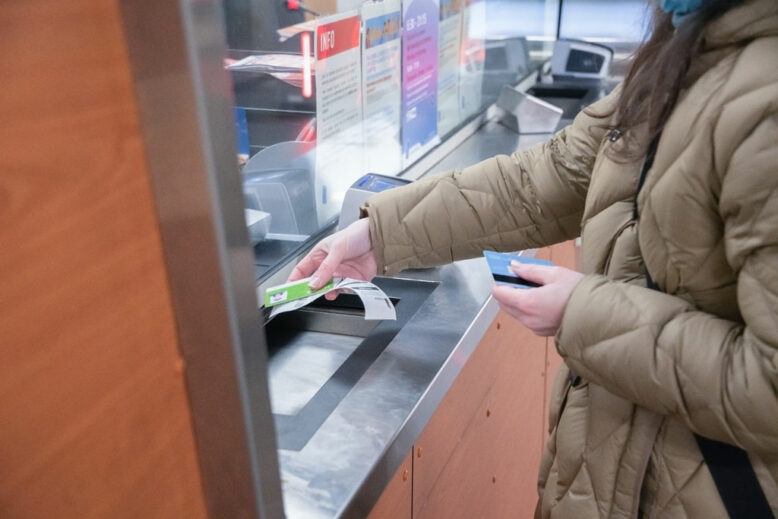
Mi sono perso / persa. Ho perso ___. Aiuto!
Getting lost is never part of a traveller’s plan, but it happens, and it is important to be able to be able to seek help. The best way to do this is, first and foremost, to state that you are lost.
Mi sono perso / persa.
Adjectives in Italian have masculine, feminine and plural forms. In this case, perso is the masculine singular form of “ lost ” and persa is the feminine singular form.
The plural equivalent of this phrase would be:
Ci siamo persi / perse.
We are lost.
Persi is the masculine plural form and perse is the feminine plural form.
If you lose one of your precious belongings, on the other hand, you can say:
Ho perso [il portafoglio].
I have lost [my wallet].
Here are a few other things an unlucky traveller might end up losing:
- il bagaglio = luggage / suitcase
- la carta di credito = credit card
- gli occhiali = glasses
- il passaporto = passport
- il biglietto = ticket
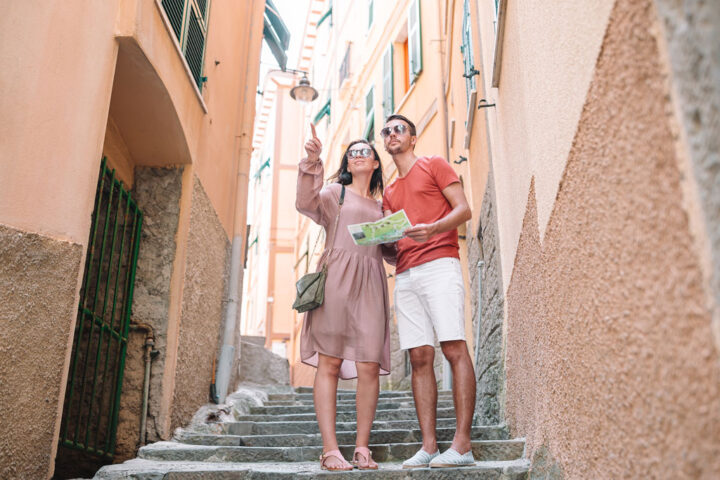
Of course, if you’re in real trouble, you can always call out for help in the following way:
Travelling around a foreign country like Italy is never easy when you don’t speak the lingo, but if you take a moment to memorise a few key travel phrases, we can guarantee that your trip will be far more relaxing and enjoyable than if you made no effort at all.
Are you about to take a trip to Italy? Which of these phrases have you managed to memorise so far? Let us know in the comments below!
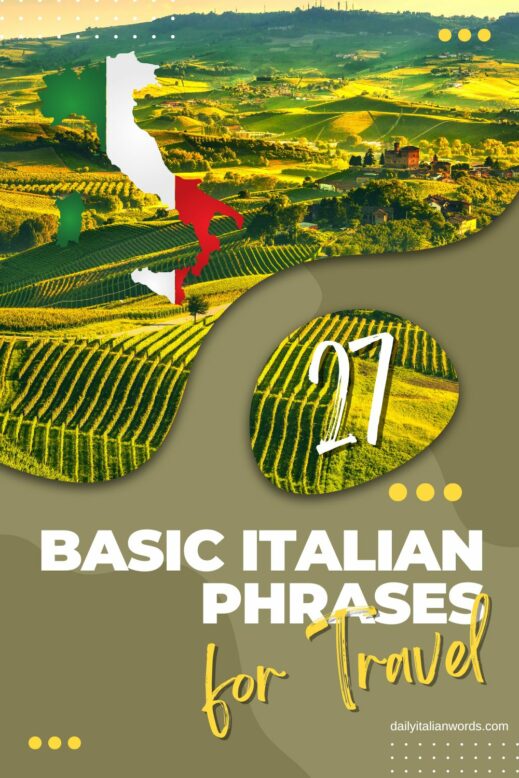
Heather Broster is a graduate with honours in linguistics from the University of Western Ontario. She is an aspiring polyglot, proficient in English and Italian, as well as Japanese, Welsh, and French to varying degrees of fluency. Originally from Toronto, Heather has resided in various countries, notably Italy for a period of six years. Her primary focus lies in the fields of language acquisition, education, and bilingual instruction.
Ethics statement: Below you will find affiliate links. If you buy something after clicking the link, we will receive a small commission. To know more about our ethics, you can visit our full disclosure page. Thank you!

Lingopie (affiliate link) is the Netflix of language learning application that uses real TV shows and movies to help you learn a new language. You can choose a show to watch based on your fluency level, and use the interactive subtitles to get instant translations to help you learn quickly.

Are you interested in improving your Italian in a fun and stress-free manner? Then we highly recommend Serena Capilli's short stories in Italian (affiliate link) , designed for beginners, advanced beginners, and lower intermediate learners (A1-B1 CEFR). These stories have been optimised for English speakers in search of a fun, laid-back learning experience! Read our full review here .
Leave a Comment Cancel reply
Save my name, email, and website in this browser for the next time I comment.
The case for eating at Italian gas stations
Food is life in Italy. Even at gas stations.
Welcome to The Upgrade, By The Way’s series on travel hacks and hot takes. See how to submit here.
Growing up in Rome as the daughter of a restaurateur, there’s no doubt that I love Italian food: fried artichokes and zucchini flowers from the trattoria, homemade pasta from the market, slices of thin square pizza from hole-in-the-wall bakeries. Oh, and coffee and sandwiches from local gas stations.
Not all Italian gas stations are created equal. Chains like Sarni, for example, are known to be a pit stop if you desperately need the toilet and a quick shot of meh-spresso to keep your eyes peeled on the road.
For la crème de la crème of Italian gas station cuisine, you must stop at the Autogrill. There you will find fresh sfogliatella, a pastry so flaky you’d think it had just been baked in the back alleys of Naples; panini riscaldato , warm sandwiches stuffed with top-grade cold cuts and cheeses; or a freshly brewed cappuccino, which, according to the unofficial rules of Italian coffee culture, should be consumed only in the morning.
Instantly recognizable by its glowing red A, Autogrill is a go-to stop for Italians on the road; there are nearly 400 locations spread out across the country .
A typical Autogrill has counters where workers serve steaming shots of espresso and cappuccinos in small, white cups. Display cases show off a rainbow of sandwiches, slices of pizza and pastries such as cornetti — stuffed with Nutella, cream or my favorite, apricot jam.
Selections often vary based on the region. A handful of Autogrills truly outdo the competition. Some have toy stores, which have supplied my childhood puzzles-and-stuffed-animals collection; bars serving bubbles by the glass; and small markets selling premium bottles of wines and spirits, cured meats, and snacks in bulk.
I’ve been in and out of Autogrills at all times of the day and night for as long as I can remember. I’ve stopped in during eight-hour bus rides to Verona for high school soccer tournaments or while shooting up and down the Roma-Napoli highway to visit my grandparents in the small region of Molise .
Sometimes my visits are long enough only for a quick bathroom break and a bag of Haribo black licorice spirals.. Other times I linger for full-blown breakfasts or lunches.
My go-to orders: pear or peach juice served in a small glass bottle and a cornetto filled with apricot jam for breakfast, and a bottle of sparkling water and a warm ciabatta sandwich stuffed with thin slices of salame, studded with just the right amount of pearls of fat, for lunch.
To me, no road trip is complete without a stop at the Autogrill. The next time you find yourself on the road in Italy, do yourself a favor and eat at a gas station.
Asia London Palomba is a Boston-based travel writer from Rome. You can follow her travels on Instagram @asialpalomba .
More travel tips
Vacation planning: Start with a strategy to maximize days off by taking PTO around holidays. Experts recommend taking multiple short trips for peak happiness . Want to take an ambitious trip? Here are 12 destinations to try this year — without crowds.
Cheap flights: Follow our best advice for scoring low airfare , including setting flight price alerts and subscribing to deal newsletters. If you’re set on an expensive getaway, here’s a plan to save up without straining your credit limit.
Airport chaos: We’ve got advice for every scenario , from canceled flights to lost luggage . Stuck at the rental car counter? These tips can speed up the process. And following these 52 rules of flying should make the experience better for everyone.
Expert advice: Our By The Way Concierge solves readers’ dilemmas , including whether it’s okay to ditch a partner at security, or what happens if you get caught flying with weed . Submit your question here . Or you could look to the gurus: Lonely Planet and Rick Steves .

You are using an outdated browser. Please upgrade your browser to improve your experience.
- Restaurants
- Best-of Guides
- MICHELIN Guide Ceremony
- My Favorites
- Subscribe to newsletter
- Booking partnership with OpenTable
- Booking partnership with Resy
- USA - English - USD
- The First MICHELIN Key Hotels: All the Keys in Italy
The MICHELIN Guide announces top honors for Italian hotels in 2024.
MICHELIN Keys Florence Italy Hotels Rome

On May 7, 2024, the MICHELIN Guide revealed the brand new One, Two, and Three Key distinctions for the most outstanding hotels in Italy. This announcement comes four years into a comprehensive refresh of our hotel selection. The MICHELIN Guide now includes over 5,000 hotels across the world, and not a single one is simply a room for the night. These are places that significantly add to your experience as a traveler, each vetted and judged excellent in five categories: architecture and interior design, quality and consistency of service, overall personality and character, value for the price, and a significant contribution to the guest experience in a particular setting. Which brings us back to the Keys. The culmination of countless hours of evaluation by our team of experts, the Key hotels below represent the highlights of our broader selection. Like the MICHELIN Stars for restaurants, the MICHELIN Keys are our most outstanding hotels. In total, the 2024 MICHELIN Guide hotel selection in Italy includes 8 Three Key hotels, 31 Two Key hotels, and 107 One Key hotels. Want to know more about the MICHELIN Key? Here’s everything you need to know . Or, head below to see all the Keys.

How To Look Through the List
Jump straight to the list or take a deeper dive into select key hotels..
See the palazzo in Basilicata that just earned Francis Ford Coppola his latest accolade.
Or take a look at all of Italys 3-Key hotels, in photos.
Subscribe to our newsletter for more like this.
Highlights of the Italy 2024 Key Hotel List

Under 10 Rooms: The Tiny Keys Reign Across Italy
Expect: Bold, proprietor-driven design themes, special experiences, and hyper-personal service. The tiny hotels that pepper the cities and countryside might get lost on lists full of castles and palazzos, but these little boutiques with ten rooms or less are some the most creative and satisfying accommodations in all of Italy. It’s a given that you’ll find places like these in the Tuscan countryside ( Siena House and Follonico Suite B&B — both with just six bedrooms), but don’t miss the gems in the cities. Vico Milano is a seven room space filled with dazzling design furniture and contemporary art. Velona’s Jungle Luxury Suites is a pocket-sized jungle-themed luxury boutique full of animal-print upholstery and peacock-feather prints. Both are independently owned and marvelously compact.
A Closer Look: 10 Key Hotels with 10 Rooms or Less in Italy

Pick One: A Castle or a Farmhouse Hotel in Tuscany
Two iconic options in Tuscany earned a bevy of Keys: the castle hotel and the classic farmhouse. The former speaks for itself — ancient fortifications that were once private residences, built to house the handsomely titled, and fortified against attack. Towers, turrets, and crenellations give way to handsome wine cellars and vineyard views. Look to Castello di Casole for a masterclass in how to convert a thousand-year-old estate into a historically preserved, contemporarily luxurious hotel. Meanwhile, the motif of the Tuscan farmhouse has been emulated throughout the world — but there’s nothing like the real thing. Hotels like Lupaia and Conti di San Bonifacio make farmhouse charm into nothing less than a work of art.
Make Your Choice: The Key Decision in Italy
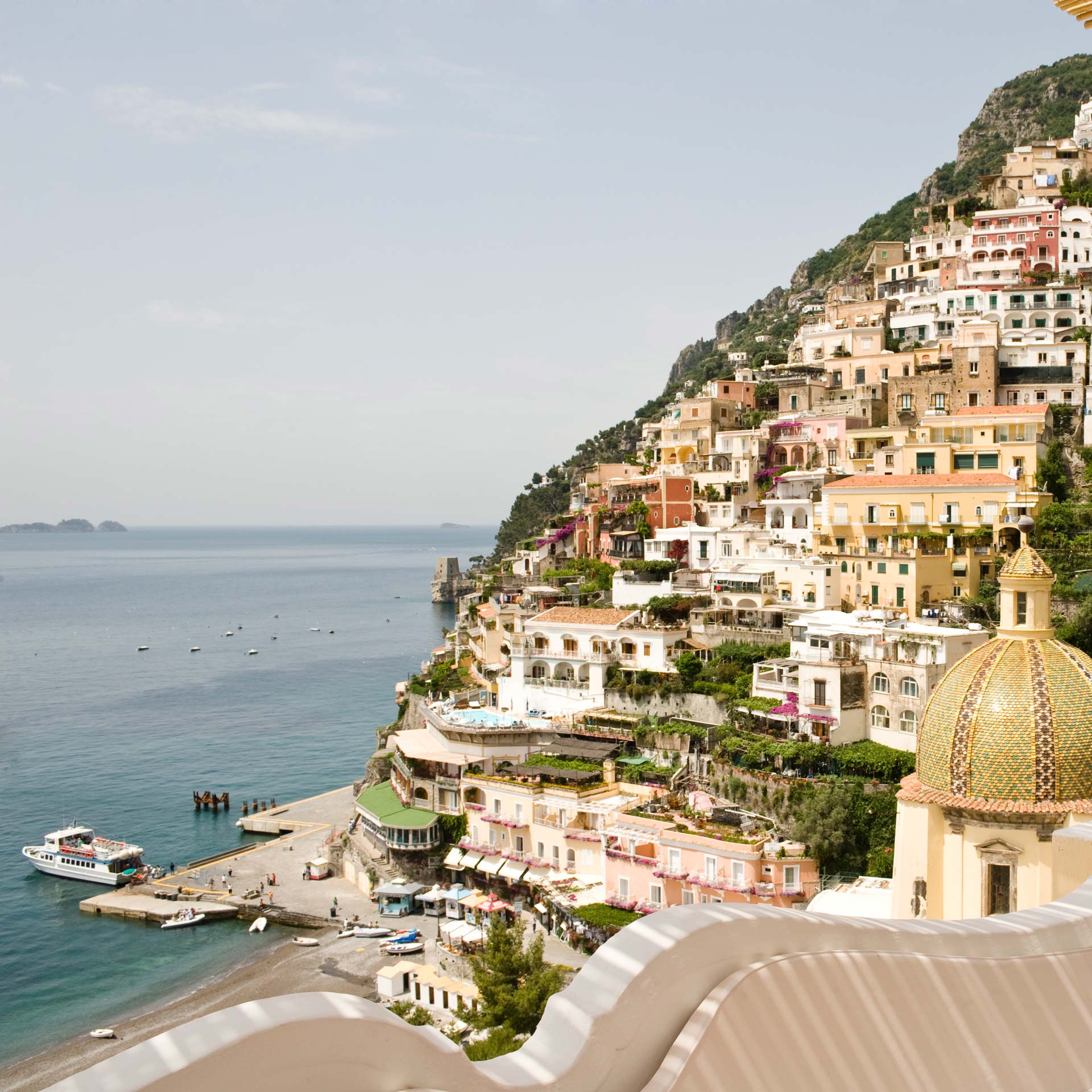
High Drama: Hotels on the Seaside of the Amalfi Coast
It’s profoundly satisfying to us that one of the most impressive places in the world has among the world’s most impressive hotels. On the Amalfi Coast, where natural cliffsides tumble down into an endless Italian sea, hotels like Palazzo Pascal and Le Sirenuse host guests in miraculous buildings that served for centuries as aristocratic homes over the water. Casa Angelina and Borgo Santandrea sport more modern builds. In either case, the views are perennially spectacular. Also read: High Drama in the Seaside Hotels of the Amalfi Coast

Click below to jump to each distinction:
The three key hotels.
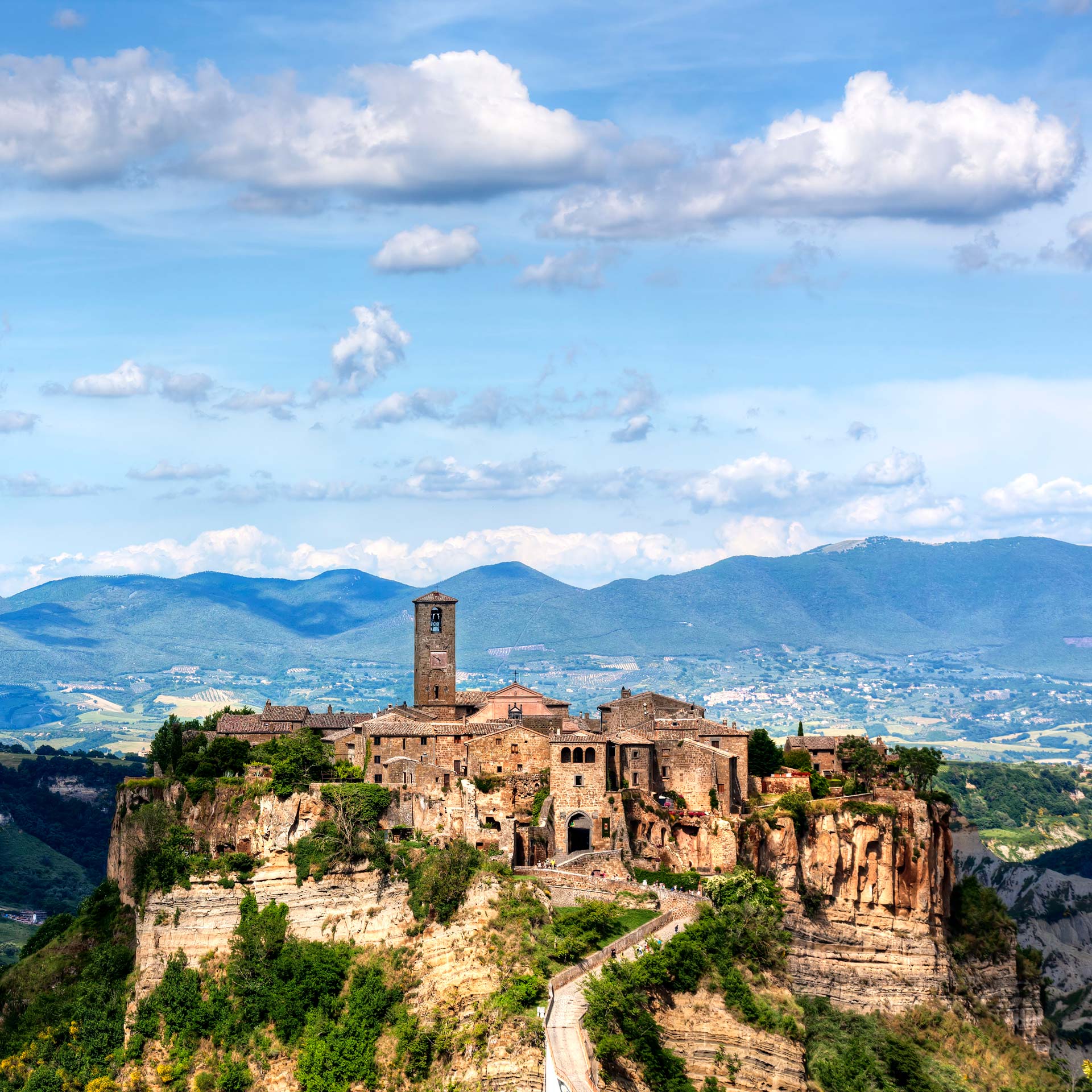
Capri: JK Place Capri Civita di Bagnoregio: Corte della Maestà Lisciano Niccone: Castello di Reschio Modena: Casa Maria Luigia Montalcino: Rosewood Castiglion Del Bosco Positano: Il San Pietro di Positano Venice: Aman Venice Venice: Cipriani, A Belmond Hotel, Venice
New York by The MICHELIN Guide – expert insights on where to dine, stay and explore
The two key hotels.
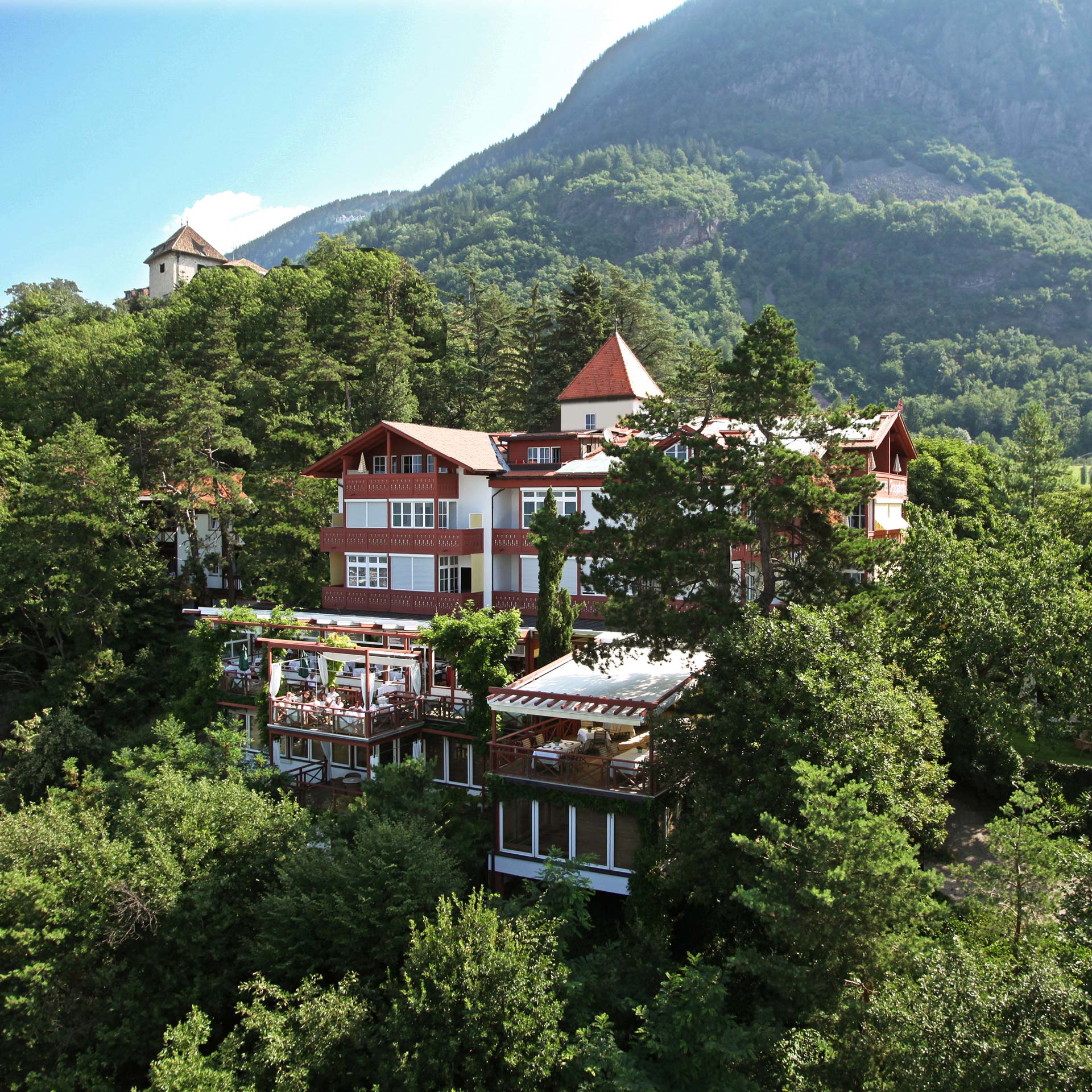
Amalfi: Borgo Santandrea Amalfi: Hotel Santa Caterina Capri: Capri Palace Jumeirah Castelnuovo Berardenga: Hotel Borgo San Felice Cogne: Bellevue Hotel & Spa Florence: Four Seasons Hotel Firenze Florence: Palazzo Portinari Salviati Residenza D'Epoca Florence: Villa Cora Florence: Villa La Massa Limone sul Garda: EALA My Lakeside Dream Lipari ME: Therasia Resort Menaggio: Grand Hotel Victoria Merano: Castel Fragsburg Merano: Villa Eden The Leading Park Retreat Milan: Bulgari Hotel Milano Milan: Grand Hotel et de Milan Milan: Portrait Milano Montaione FI: Castelfalfi Piegaro: I Borghi dell'Eremo Pinzolo: Lefay Resort & Spa Dolomiti Plose: Forestis Dolomites Rome: Hotel Vilòn Rome: JK Place Roma Siena: Castello di Casole, A Belmond Hotel, Tuscany Sorrento: Bellevue Syrene 1820 Sorrento: La Minervetta Taormina: Grand Hotel Timeo, A Belmond Hotel, Taormina Taormina: San Domenico Palace, Taormina, A Four Seasons Hotel Torno: Il Sereno Tremezzo: Grand Hotel Tremezzo Venice: Hotel Gritti Palace
The One Key Hotels

Arco: Vivere Suites and Rooms Arenella: Donna Coraly Country Boutique Hotel Arezzo: Villa Fontelunga Arzachena: Cascioni Eco Retreat Bernalda: Palazzo Margherita Cagliari: Casa Clàt Caldaro: Lake Spa Hotel SEELEITEN Camaiore: Locanda al Colle Capalbio: Locanda Rossa Capri: Capri Tiberio Palace Castelrotto: COMO Alpina Dolomites Castiglione della Pescaia: L’Andana Cernobbio: Villa d'Este Chiusdino: Borgo Santo Pietro Cinigiano: Castello di Vicarello Como CO: Palazzo Albricci Peregrini - Como Cremolino: Nordelaia Cutrofiano: Critabianca Fiesole: Villa San Michele, A Belmond Hotel, Florence Florence: Ad Astra Florence: Brunelleschi Hotel Florence: Hotel Calimala Florence: Hotel Lungarno Florence: Riva Lofts Florence Florence: Torre di Bellosguardo Florence: Velona's Jungle Luxury Suites Forio di Ischia: Mezzatorre Hotel & Thermal Spa Forio NA: Botania Relais & Spa Forte dei Marmi: Principe Forte dei Marmi Gargnano: Lefay Resort & Spa Lago di Garda Gavorrano GR: Conti di San Bonifacio Lake Orta Novara: Villa Crespi Lana: Vigilius Mountain Resort Lecce: La Fiermontina Palazzo Bozzi Corso Lecce: Palazzo de Noha Locorotondo: Ottolire Resort Madonna di Campiglio: Biohotel Hermitage Maranza: Milla Montis Massa Lubrense: Art Hotel Villa Fiorella Massa Lubrense: Relais Blu Matera: Sextantio Le Grotte della Civita Menfi: La Foresteria Planeta Estate Milan: Hotel Principe di Savoia, Dorchester Collection Milan: Mandarin Oriental Milan Milan: Vico Milano Moltrasio: Passalacqua Montalcino: Castello Banfi - Il Borgo Relais & Chateaux Montalcino: Villa le Prata - Residenza del Vescovo Montepulciano: Precise Tale Poggio Alla Sala Noto: Country House Villadorata Noto: Seven Rooms Villadorata Ortisei: Gardena Grödnerhof Hotel & Spa Ostuni: Paragon 700 Boutique Hotel & SPA Otranto: Baglioni Masseria Muzza Perugia: Hotel Castello di Monterone Pettenasco: Laqua by the Lake Pognana Làrio: Villa Làrio Lake Como Polizzi Generosa: Susafa Porto Ercole: Il Pellicano Positano: Le Sirenuse Praiano: Casa Angelina Ravello: Caruso, A Belmond Hotel, Amalfi Coast Riva del Garda: Lido Palace Rome: Hassler Roma Roma: Hotel Eden, Dorchester Collection Rome: Bulgari Hotel Roma Rome: Hotel Locarno Rome: Maalot Roma Rome: Portrait Roma Rome: Rocco Forte Hotel De La Ville Rome: Rocco Forte Hotel de Russie Rome: Singer Palace Hotel Rome: Six Senses Rome Rome: The Hoxton, Rome Rome: The Inn at the Roman Forum Rome: The St. Regis Rome Rome: Umiltà 36 San Cassiano: Lagació Hotel Mountain Residence San Pietro In Cariano: Byblos Art Hotel Villa Amista Sant'Agnello: Mediterraneo Sorrento Santa Margherita Ligure: Grand Hotel Miramare Santo Stefano di Sessanio: Sextantio Sarentino: Terra - The Magic Place Savelletri di Fasano: Borgo Egnazia Savelletri di Fasano: Masseria Calderisi Savelletri di Fasano: Masseria Torre Coccaro Savelletri di Fasano: Masseria Torre Maizza Scala: Palazzo Pascal Schnals: Goldene Rose Karthaus Sirmione BS: Villa Cortine Sorrento: Grand Hotel Excelsior Vittoria Tavarnelle Val di Pesa: COMO Castello del Nero Torre Canne di Fasano: Canne Bianche Lifestyle Hotel Torri del Benaco: Cape of Senses Torrita di Siena: Follonico Suite B&B Torrita di Siena: Lupaia Torrita di Siena: Siena House Umbertide: Vocabolo Moscatelli Boutique Hotel & Restaurant Venice: Ca’ di Dio Venice: Corte di Gabriela Venice: Hotel Londra Palace Venice: Il Palazzo Experimental Venice: Nolinski Venezia Venice: Palazzo Maria Formosa Venice: Palazzo Venart Luxury Hotel Vicenza: La Barchessa di Villa Pisani Zafferana Etnea: Monaci delle Terre Nere
Hero Image: Castello di Reschio — Lisciano Niccone

Thomas Keller Talks 20 Years of Per Se and His New York
The chef behind the Three MICHELIN Star staple shares his love of Manhattan.

How to Spend a Weekend in Monterey, California
Discover why this slice of California is at the top of so many travelers' bucket lists.

Ronny Chieng's New York - The Perfect Slice and Haute Sushi
The actor and comedian breaks down his West Village staples.

The Farmhouse Hotels of Southern Italy
A bevy of historic country retreats make their presence felt among Italy's first-ever Key hotels.
Keep Exploring - Stories we think you will enjoy reading

Elevate Your Mother's Day Celebrations with Afternoon Tea at MICHELIN Hotels
How better to honor the woman who does it all for us?

The Key Decision in Tuscany
The sublime magnificence of a castle or the simple charm of farmhouse? In the end, it comes down to the traveler.

High Drama in the Seaside Hotels of the Amalfi Coast
After hotel Key announcements in Italy, the Amalfi Coast shows off its distinguished collection.

10 Key Hotels with 10 Rooms or Less in Italy
Our smallest Key hotels across Italy are overflowing with passion and personality.

In Photos: Every Three Key Hotel in Italy
The ins and outs of the most outstanding hotels in the country.

Palazzo Margherita Is Coppola Family Business
A palazzo in a small town in the south of Italy just earned Francis Ford Coppola his latest accolade.

Castello di Reschio Is a Medieval Masterwork
Castello di Reschio will never be mistaken for a Disneyfied fantasyland. This 1,000-year-old Umbrian castle hotel reflects the artistic vision of one man — and it just earned Three MICHELIN Keys.

Tommy Hilfiger's New York is Bold, Classic, and Luxe
The man who dresses America (and the world) indulges in the best Manhattan has to offer.

Time-Tested Country Escapes Just Outside Paris
Seven historic chateaus, remade abbeys, and the spots that have welcomed city escapees for centuries.

Rosewood Kona Village Breathes Luxurious New Life into Legacy
Ten years after a devastating tsunami destroyed it, Kona Village is back and better than ever.
MICHELIN Guide

Use the app to find the best restaurants and hotels everywhere
Be the first to get news and update about the michelin guide.
MICHELIN Guide selections
The michelin group.
- Terms of Use
- Privacy Policy
- Legal Notice
Display settings
Customize your experience by easily adjusting display settings for territory, and currency to suit your preferences!
Member privileges
The Plus program provides upgrades and amenities at participating hotels. For this hotel, Plus members will receive:
Non-members can add the privileges at checkout through our 30 day free trial, cancellable at anytime.
- International edition
- Australia edition
- Europe edition

Drukkje min broderѕ blod! Why the best Eurovision songs are no longer in English
While Europe’s lingua franca remains dominant, there has been a definite shift since a Portuguese song triumphed in 2017
T here was a time when in order to win Eurovision you had to “fly on the wings of love”, “take me to your heaven” or “sail into infinity while reaching for divinity”. This year, however, there’s a fair chance the winner will estar comiendo el mundo ( be eating the world), ridere in queste notti bruciate (laugh in these burnt nights) , or even drukkje min broderѕ blod (drink my brother’s blood) .
The metaphors may have been mixed, but for the first two decades of the 21st century, the English language reigned supreme at the Eurovision song contest. In the run-up to the millennium, the so-called language rule restricted English songs to countries that counted it among their official languages, such as Britain, Ireland and Malta. But when the rule was scrapped in 1999, the floodgates opened.
Out of the next 18 winners, only Serbia’s Molitva in 2007 did not feature any English lyrics at all. Such was Eurovision’s anglophilia that even Russia triumphed with a song containing the line, “Cause I got something to believe in as long as I’m breathing”. By 2014, more than three-quarters of entries were sung entirely in English, rising above 80% in the three years that followed.

Then, in 2017, something unexpected happened: Portugal’s Salvador Sobral won the grand final with Amar Pelos Dois, a song sung not in one of Europe’s most common languages, but in a tongue with only about 10 million native speakers on the continent. Sobral’s Portuguese upset changed the formula for Eurovision success: of the last six winners, three have been in a language other than English, with leather rockers Måneskin proving Italian-language songs can also work outside the giddy delirium of the five-day competition.
English, Europe’s lingua franca, remains dominant, and the shift towards non-English songs at Eurovision has been subtle. Yet it has followed a distinct trend. Of the 37 songs in the semi-finals this year, 49% are at least partially sung in a non-English language – up 11 percentage points from last year’s contest, and a 16-year-high. The entries with the biggest pre-competition buzz – Angelina Mango’s taut piece of steelpan pop La Noia, Marina Satti’s Rosalia-esque Zari and Joost Klein’s gabber-infused Europapa – are sung in Italian, Greek and Dutch, with no more than a few English phrases sprinkled over the top.

Is it too obvious to identify Britain’s vote to leave the EU as the point at which the tide began to turn? In May 2017, amid tense negotiations over Brexit, then European Commission president, Jean-Claude Juncker, said, “slowly but surely English is losing importance in Europe” . What may have been intended as a tactical tease gained a prophetic ring when Sobral triumphed in Kyiv just days later.
“It was an act of liberation,” says Irving Wolther, a German linguist and Eurovision historian. “For years, the Brits had treated [Eurovision] as this freak show that was just badly copying music first pioneered in the UK, when in fact there is plenty of dreck in the British charts too. After Brexit, there was a sense of ‘Now we are no longer being patronised by the Brits, we Europeans can express our own voice.’”
Others see less overtly political developments behind the shift. “I wouldn’t go as far as saying this is all about Brexit,” says André Wilkens, director of the Amsterdam-based European Cultural Foundation. English may be nothing less than Europe’s lingua franca, but also nothing more, Wilkens argues – a tool that has enabled different European countries to communicate with each other. “But with the rise of machine translation, you no longer need to sing in English to be understood.”

As Eurovision approaches its 70th anniversary, it has grown in size and reach, with last year’s concerts in Liverpool being followed by 162 million people across various media. The competing songs are released weeks or months in advance on social media, with translations of the lyrics displayed in the subtitles.
The newfound belief in the power of non-English pop songs to transcend national barriers appears to be driven by Eurovision’s fans rather than the music and television executives who cook up each year’s entries, said Solveig Bollig, a linguist who coordinates a course called Linguistics and the Eurovision song contest at Umeå University in mid-northern Sweden .
“The jury voters usually favour marketable songs in English that stand a chance of penetrating the charts in as many countries as possible,” Bollig says. “The audience vote tends to be more open to songs in other languages. They value it as an expression of identity.”
Last year’s final featured another triumph for Eurovision record-holder and resolute English-language stalwart Sweden, which has not submitted a single Swedish-language song since the scrapping of the language rule in 1999. “All I care about is you / You’re stuck on me like a tattoo,” sang Loreen, last year’s Swedish Eurovision winner. But a poll of the audience at the M&S Bank Arena Liverpool had by a considerable margin chosen a different favourite: Finland’s Käärijä, with a chorus that went Cha, cha, cha, toinen silmä jo karsastaa .

The decline of linguistic competence as a requisite for communication and its rise as a marker of identity may also explain the growing prevalence of minority languages at the contest. Australia’s entry is sung in English, but has lines in Yankunytjatjara, an Australian Aboriginal language. Norway has entered a reinterpretation of a Norwegian medieval ballad, its lyrics written in a partially modernised version of the non-standardised Telemark dialect.
“All this has quite sad implications for the UK,” says academic Kajsa Törmä, who co-conceived the course on Eurovision linguistics at Umeå University. “You are not on a roll and haven’t been for quite a while, and now that the dynamics at Eurovision are changing, you haven’t even got another language to fall back on.”
- Eurovision 2024
Most viewed

IMAGES
VIDEO
COMMENTS
We've provided some useful resources at the end of this article to help you learn Italian travel phrases useful for your trip. Yes - Si - See. No - No - Noh. Please - Per favore - Pehr fah-voh-reh. Thank you - Grazie - Grah-tsee-eh. You're welcome - Prego - Preh-goh. Cheers! (To your health) - Salute! - Sah-loo-tay.
Basic Italian Words. Hello: Ciao (informal); Salve (formal) Goodbye: Ciao (informal); Arrivederci (formal) Good morning: Buongiorno. Good evening: Buonasera. Goodnight: Buonanotte (use this when ...
The bill, please - Il conto, per favore (eel kon-to, payr fa-vo-ray) 124. Enjoy your food! - Buon appetito! (bwon a-pe-tee-to) 125. It was delicious! - Era buonissimo! (e-ra bwon-iss-e-mo) For more phrases, check out my detailed guide on how to order food and drinks in Italian and learn how to say cheers in Italian.
Before you learn specific Italian phrases for travel, you want to learn your basics. Si - yes. 2. No - No. 3. Grazie - thank you. Grazie is the most common way to express gratitude in Italian but there are several others you may hear or want to use. Learn how to say thank you in Italian here. 4.
Click here to take the quiz for this episode: 100+ Common Italian Travel Phrases For Your Trip. Buongiorno = Hello (formal, lit. "good day") Vorrei = I'd like. Vorrei un cappuccino, grazie = I'd like a cappuccino, thank you. Vorrei pagare, per favore = I'd like to pay please.
Here are 125 of the most basic Italian phrases and words to NEED to know. Mastering common Italian phrases for travel is easy, especially Italian greetings . Whether you're lost amongst the floating alleys of Venice , ordering a tasty gelato in Rome , or browsing the boutiques of Milan, this Italian travel phrase guide will help
Equip yourself with these essential Italian travel phrases to make your next trip smooth and enjoyable. Start with "Scusi, dov'è…". (Excuse me, where is…) when you are looking for a specific place. Always begin your request with politeness to engage helpful responses from locals. Use "Dove posso trovare…".
Common Italian phrases for getting around . When moving through a city, learning some basic Italian phrases for travel can help get you to where you're going. Despite the convenience of maps on your phone, they are not always 100% accurate or you might not have an international sim card for data. That means you might need to ask a local how to find your destination or even how to get back to ...
30+ common Italian phrases for your trip to Italy. There's no better way to level up your trip to Italy than by practicing your Italian! Learning a few key phrases will help you feel more confident ordering in an Italian gelateria (gelato shop) and chatting with locals over an espresso and colazione (breakfast).
5. Use them in your everyday conversations. Try to find as many opportunities as possible to use basic Italian phrases in your daily routines. A great way to practice without having to find a language partner is by thinking or narrating what you're doing in Italian. 6. Use flashcards.
Basic Italian Words & Phrases (Perfect for Travelers!) Perfect for beginners, here are 70 basic Italian words and phrases for travel inc. getting around, booking hotels, eating & drinking, etc all with phonetic pronunciation. Impress locals and enhance your experience! When it comes to visiting Italy, whether you're planning a trip to Rome ...
Focus on basic Italian phrases that'll get you through daily interactions. Remember, "Ciao" isn't the only way to say hello! 😉. - **Sentence Structure**: Italian sentences have their own rhythm. Pay attention to how they're built—it's like learning to dance with words. 💃🕺. - **Speak Up**: Practice makes perfect.
Politeness in Italy goes a long way. Basic Italian phrases like "Per favore" (Please) and "Grazie mille" (Thank you very much) show your appreciation and good manners. When in doubt, always opt for courtesy. Italian. English. Mi dispiace. I'm sorry (to express remorse, but it isn't your fault) Scusa.
These phrases should give you a great starting point for communicating in Italian. They cover basic greetings, essential questions, and polite expressions that are useful in everyday interactions. Good morning. Buongiorno (bwon-jor-no) Good evening. Buonasera (bwon-ah-seh-rah) Please.
Communicating in the local language can deepen connections with native speakers and unlock experiences that English alone may miss. I've created a basic Italian travel phrases PDF to assist your journey. Accessible and user-friendly, it's a good idea to download the PDF and make it your ideal companion for swift reference while on the move.
Most restaurants in areas that attract lots of tourists will have an English version of the menu. But, some of the best food in Italy is off the beaten path, so it's best to know some basics in case you venture into a restaurant that only offers its menu in Italian. #55 Pomodoro - tomato. #56 Aglio - garlic.
Some Italian phrases tourists should know. To make the most of your trip, you should also learn some essential travel terms and phrases. Knowing a handful of travel words and phrases in Italian gives you more freedom to explore: even in the most visited cities, assuming English is enough to get by is a big travel mistake.
Learn the most useful Italian travel phrases for your trip to Italy. With these, you'll be able to communicate about directions, dining, transport, and more! 100+ Useful Italian Travel Phrases - From A Travel Guide In Italy (+ Printable Cheat Sheet!)
She is an aspiring polyglot, proficient in English and Italian, as well as Japanese, Welsh, and French to varying degrees of fluency. Originally from Toronto, Heather has resided in various countries, notably Italy for a period of six years. Her primary focus lies in the fields of language acquisition, education, and bilingual instruction.
Knowing just a few simple Italian travel phrases will make your life—and the lives of the many Italians that you'll meet—better. Furthermore, Italian is the language of love, and we at ItalianPod101 strongly believe that everybody should know at least some Italian travel words and phrases. 3. The Essential Italian Phrases for Travel
Italy is an exhilarating place to travel, but during high season, it can also be challenging at times. Just in time for those summer trips, the following bits of advice will help you maximize the fun of your Italian escape. ... Take the time to pick up a few phrases before your trip, and rest assured, you'll likely find yourself beaming every ...
For la crème de la crème of Italian gas station cuisine, you must stop at the Autogrill. There you will find fresh sfogliatella, a pastry so flaky you'd think it had just been baked in the ...
The town of San Vero Milis, in Sardinia, is planning to authorize naturist weddings on the beach. Mayor Luigi Tedeschi, who designated part of the beach for nudists in 2022, says that it's not ...
Elektrostal is a city in Moscow Oblast, Russia, located 58 kilometers east of Moscow. Elektrostal has about 158,000 residents. Mapcarta, the open map.
The Three Key distinction is the highest hotel honor in The MICHELIN Guide. Earning One Key (107 properties) or Two Keys (31 properties) is difficult enough, but only eight hotels received the Three Key distinction in Italy. These hotels excel in all five criteria used to judge hotels by our Inspectors. Here, we thought it fitting to focus on just one of those criteria — the most photogenic ...
On the Amalfi Coast, where natural cliffsides tumble down into an endless Italian sea, hotels like Palazzo Pascal and Le Sirenuse host guests in miraculous buildings that served for centuries as aristocratic homes over the water. Casa Angelina and Borgo Santandrea sport more modern builds. In either case, the views are perennially spectacular.
Sobral's Portuguese upset changed the formula for Eurovision success: of the last six winners, three have been in a language other than English, with leather rockers Måneskin proving Italian ...
If possible, verify the text with references provided in the foreign-language article. ... Elektrostal is linked by Elektrichka suburban electric trains to Moscow's Kursky Rail Terminal with a travel time of 1 hour and 20 minutes. Long distance buses link Elektrostal to Noginsk, Moscow and other nearby towns. Local public transport includes buses.
In travel news this week: submersible superyachts for billionaires, the megahub airport that could be the world's busiest, plus new digital nomad visas in Turkey and Italy.
You could consult a travel guide or Instagram to find overcrowded tourist attractions. Or you could use a detective novel to uncover shadowy, more surprising corners of cities like Los Angeles ...